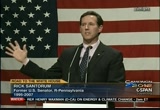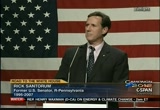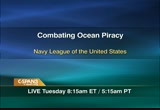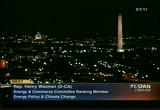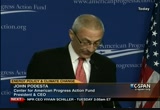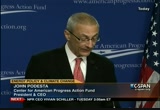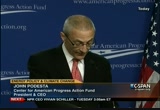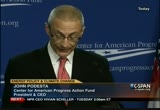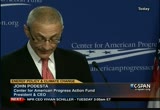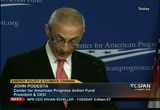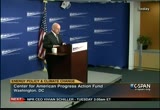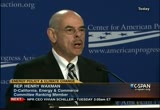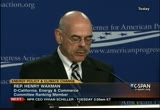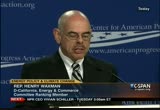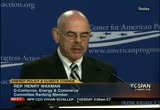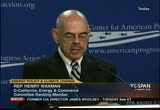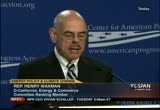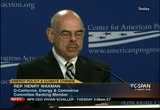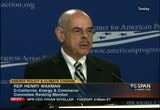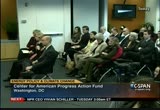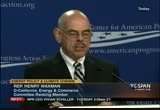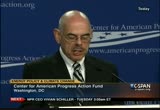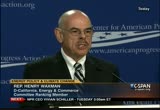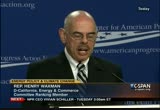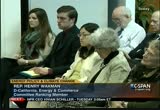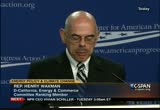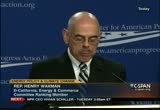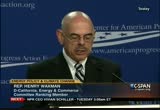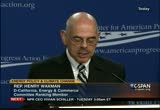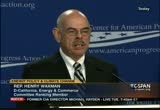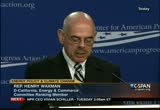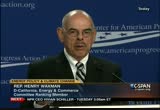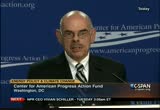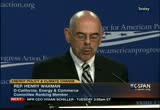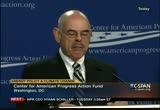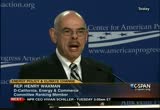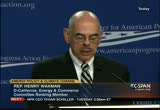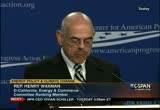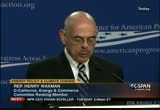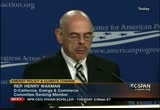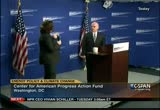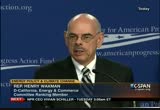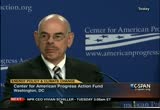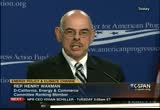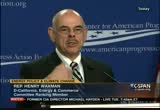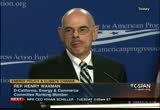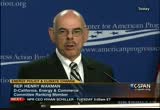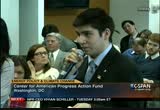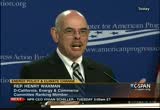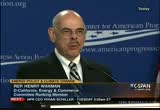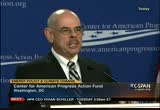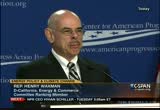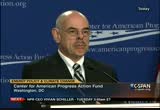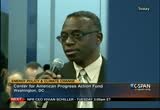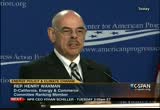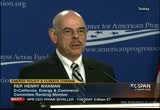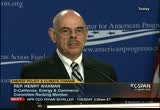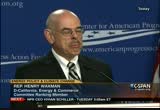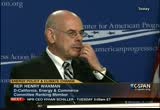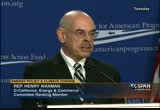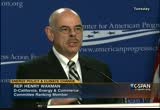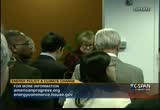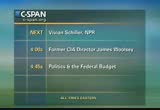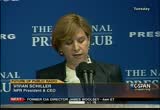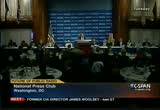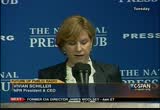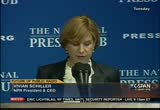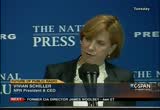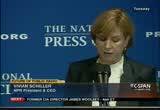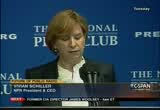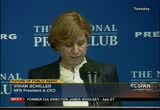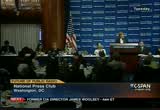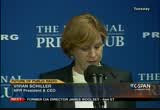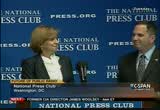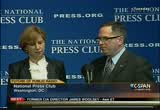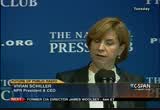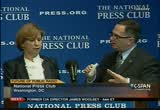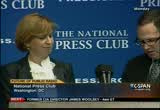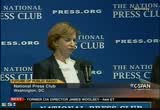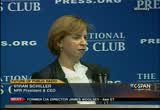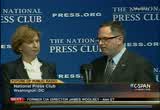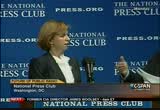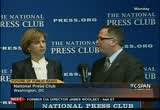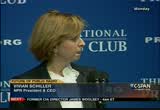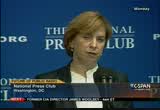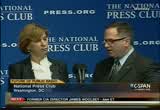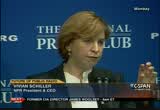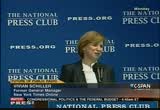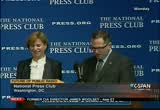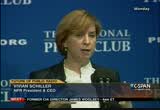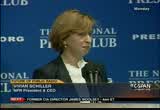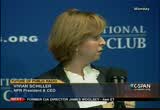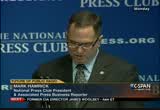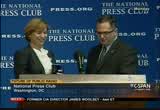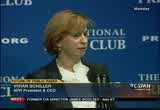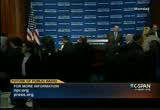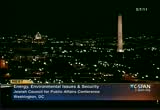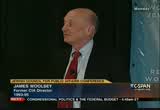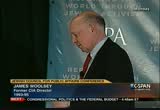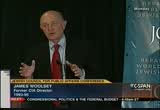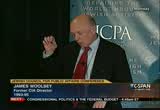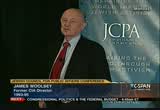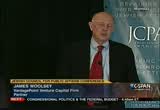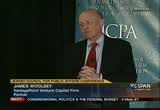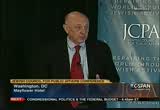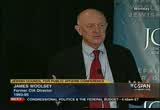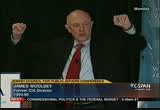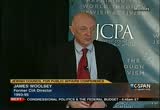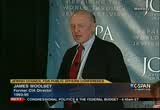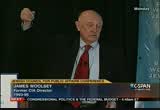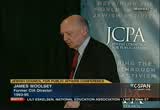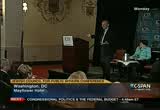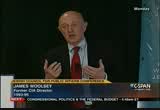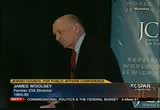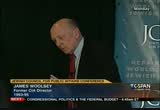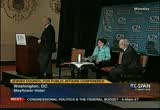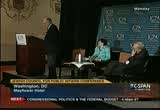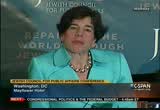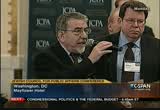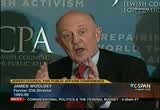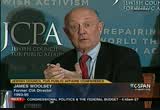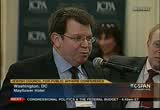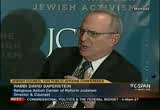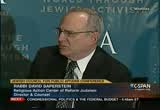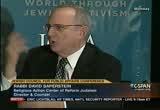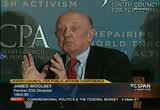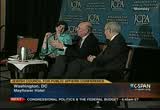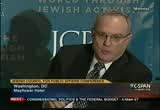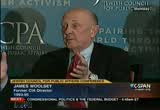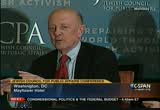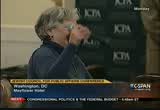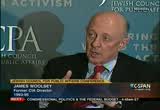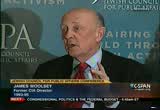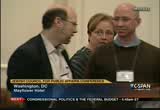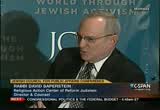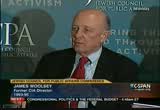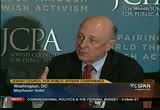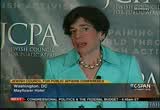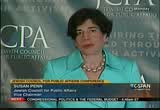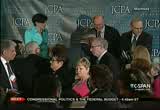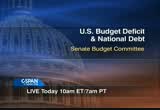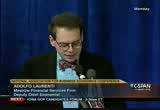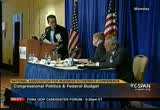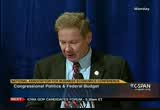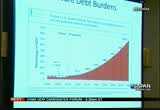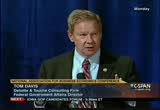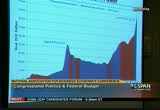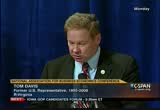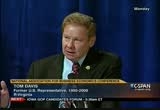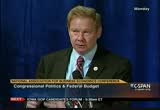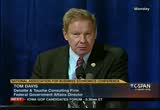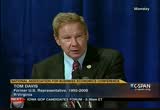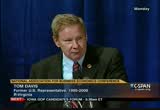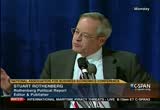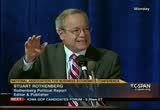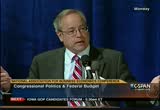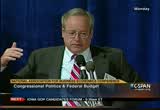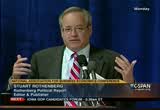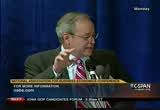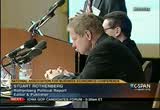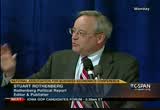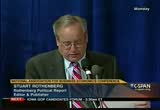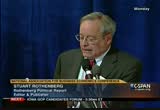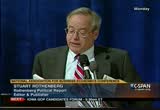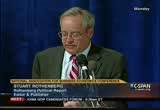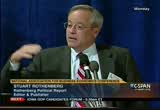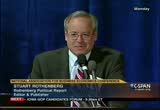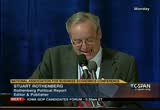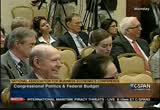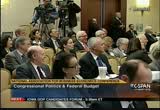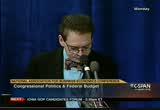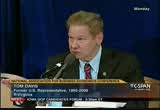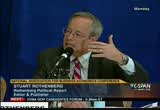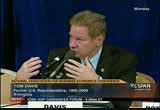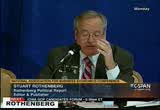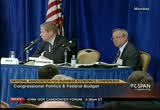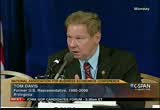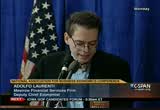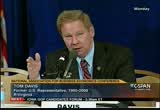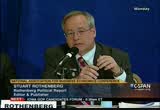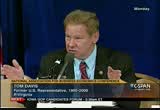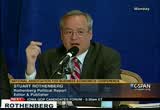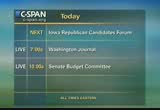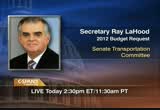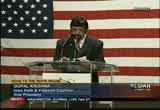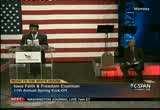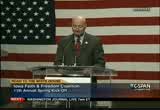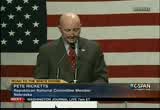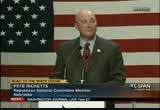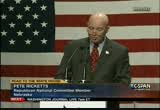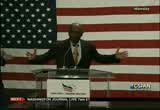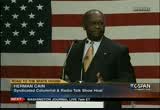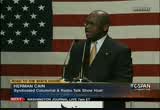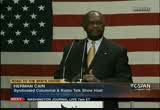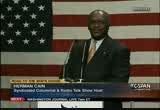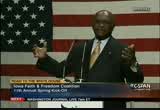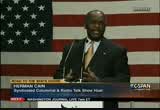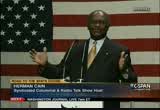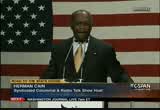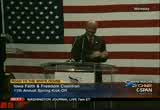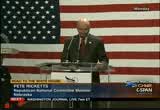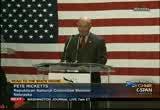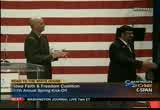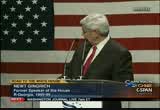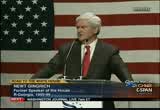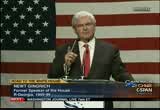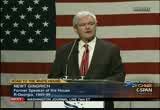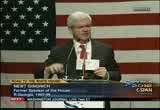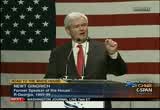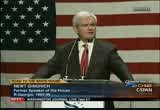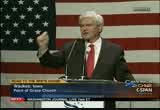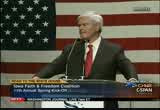tv Today in Washington CSPAN March 8, 2011 2:00am-6:00am EST
2:00 am
finished the speech. i talked about these children whose mothers and fathers had to fight to find a hospital so they could be born. it was easy. they could find places to be aborted but they could not find a hospital where these disabled children who are the target of partial birth abortion, the could not find a hospital. i talked about these miracles. we had to vote the next day and we lost. i thought, what a failure. i had gone home to wait to talk the kids in and karen was asleep. i was a failure as a father and husband. five days later, an e-mail came. it came from a student from michigan state who said, five nights ago, i was looking through c-span and i saw you talking about these children. my girlfriend and i stopped and as we watched, i noticed the tears were running down her face. i asked her what is wrong and
2:01 am
she looked up and said, i am pregnant and i have an abortion scheduled for next week but i will not have it anymore. [applause] the young man said, did not win that battle to overturn the veto but you saved a life of my child. god will be faithful if you do your part and are faithful to his country. we will reclaim this land and make it greater. thank you and god bless you. [applause] >> in a speech today, and waxman
2:02 am
was critical of republicans blocking the epa from regulating greenhouse gas and commissions. that is next on c-span. after that, the president of npr talks about federal funding for public broadcasting. later, we will hear from former cia director james woolsey. tomorrow, an update on international piracy threats. members of the u.s. navy, coast guard, and the royal canadian navy will discuss tactics and how civil unrest is driving more poor people to resort to piracy. it starts at 8:15 eastern on c- span. -- on c-span3. also on c-span3, layer -- ray lahood will testify before the
2:03 am
senate transportation committee. now, congressman henry waxman talks about climate change legislation. a ranking democrat on the energy and commerce committee, waxman says that obama should oppose any spending bill that ends the epa's authority to regulate greenhouse gas emissions. this is an hour. quex good morning, everyone and welcome. i am chairman for the action fund. i am pleased you could join us for this morning's discussion with congressman henry waxman. representative waxman is one of the most determined and effective progressive advocates in congress today. we all know that he has his hands full defending against a barrage of attacks on great energy and public health
2:04 am
programs. it is a special thanks to the congressman for taking time out of your schedule. thank you for being willing to come here and speak to us. i want to start by taking a moment to recognize your hard work on the american queen in ag and security act in the previous congress. the house passage was a success. it would have lowered production costs by spurring investment in clean energy technology while controlling costs. thanks to his leadership, it had broadbased support that it needed to win final approval in the house of representatives. unfortunately, [unintelligible] from passing complementary
2:05 am
legislation and given the hill, we'reoliticacapitol unlikely to see a similar package,. the bill pointed the country in the right direction. i have no doubt that the u.s. will move down the path of -- outlined by chairman waxman and congressman markey. the center for american progress and the fund had focused on shaping strong markets, investing in world- class infrastructure. they will create certainty for clean energy investors and businesses while building a foundation for robust future growth. these technologies will help the largest polluters reduce their carbon dioxide pollution under rules to be set by the environmental protection agency. another area of our focus remains ending our independence
2:06 am
-- our dependence on foreign oil. did we need another week of call? oil prices are at their highest level. before the spike that was caused by the turmoil in north africa and the middle east. imported oil already accounted for half of our trade deficit. you would think congress would act with haste to bring on technologies that would increase efficiency and switch our fuel mix to less volatile domestic supplies. what was the house's response? to cut investments in oil and programs including public transit, high-speed rail, and programs to help factories retooled to make cleaner cars. that is insanity masquerading as fiscal discipline. we are not without hope since it does not appear the administration will get much help from the current house majority. it will need to do more with
2:07 am
current authorities including setting fuel economy standards for 2017 through 20/20 five model years that follow up on the initial improvements that were going into effect this year that were settled in 2009. it needs to complete a first of all fuel efficiency standards for heavy-duty trucks. it can encourage congress to increase the availability of incentives for people to buy super efficient cars and electric vehicles and create incentives to move fleet vehicles to run on domestically produced natural gas. the administration can take some short-term steps to protect businesses and families, including making oil available through a strategic petroleum reserve release and encouraging to come out of -- to crack down on speculators to keep oil
2:08 am
prices down. as we push for to meet the short-term rates, we would do well to remember our broader vision for cleaner energy and why we set out to do this work in the first place. moving our economy to a clean energy path requires us to modernize our infrastructure, to invest in high-tech research and revitalize our manufacturing center to build these technologies and export them to the rest of the world. it means building up the skills of our work force so american workers can succeed at the millions of new jobs a clean energy economy will create. our competitors are added. we need to be added as well. by building a new industries and building up technologies that other countries will want to use, we will make our economy stronger and far more competitive. representative waxman has much more to say about this clean energy vision and the challenges and opportunities of making it a reality. it is my pleasure to recognize
2:09 am
the congressman and get the conversation started. henry waxman represents the 30th district in california. he chaired that committee as well as the committee on oversight and government reform. throw his 35 years in service, the he has championed environmental and public health protections, introducing the first, bill in congress in 1992, serving as the author of the 1990 clean air act that stop acid rain and as i mentioned, offering the american clean energy and security act of 2009. he is a longtime advocate of issues from medicaid improvements to prevail and long-term care. he was a tremendous leader in crafting the historic patient protection act and affordable care iraq. there is no better champion on capitol hill working to make the vision, the clean energy vision
2:10 am
a reality. we are excited to have the congressman today. after he speaks, we will have a q&a. it is a tremendous honor to have a year. the podium is yours. [applause] >> thank you for that very kind introduction. i am delighted to be with you and your colleagues here the center for american progress. i want to salute the outstanding work that you do. this morning, i want to speak to you as bluntly as possible. during my career in congress protecting health and the environment has been my top priority. during those years, i have been in many battles. i fought president reagan's efforts to roll back the clean air act in the 1980's and went
2:11 am
on to pass landmark 1990 clear -- clean air act revisions over the opposition of many industries until we were able to work out a bipartisan consensus. i battled efforts by vice- president dan quayle and his council on competitiveness. tom delay and the case tree project, and president george w. bush and vice president dick cheney's efforts to roll back the law on the environment. i have never been in a congress where there was such an overwhelming disconnect between science and public policy. the republicans in congress have become the party of science deniers and that is profoundly dangerous. exhibit a in the republican attack on science is the upton inhof bill. that carbon emissions endanger
2:12 am
health and welfare. when we had a hearing, senator in halimhof said climate changea hoax. the newly republican majority in the house has a lot of power to write in rewrite our nation's laws, but they do not have the power to rewrite the laws of nature. cancer and they cannot stop climate change by declaring it a hoax. findings andepa's stripping it of regulatory authority will not stop carbon pollution from building up andrew will not stop the droughts and floods that are ravishing nations across the globe. it will not protect the air quality of our cities when summer temperatures soar to record levels and it will not stop the strange weather
2:13 am
patterns that looked much of our nation into a deep freeze this winter. the republican rejection of science is also visible at to h.r. 1, the concurrent funding resolution. it is a reckless assaults on our laws. it will strip protections. they do this by cutting the funding is for the epa by almost one-third. epa and the states will have neither the authority nor the resources to carry out the clean air act, ensure safe drinking water, protect rivers and lakes or cleanup. that is not all. when the legislation hit the floor, republicans adopted the amendment after amendment saying no funds could be used because they could not change law but they could say no funds could be
2:14 am
used to do a lot of important things like requiring cement kilns to clean up toxic mercury emissions which demonstrate our children think and learn. they barred the epa from considering the impact of air pollution from oil and gas drilling along the arctic coast. they defended efforts to protect water quality in the chesapeake bay and florida. they it asserted protections against the worst mining practices, they prevented regulation of toxic coal ash and set to block the funding to set air quality standards to protect against life-threatening pollution. with a direct attack on federal efforts to understand that prevent climate change, they defended epa's efforts to reduce carbon emissions and
2:15 am
prevented the u.s. from supporting the work of the intergovernmental panel on climate change, the leading body studying climate change. this prompted "the new york times" to write an editorial yesterday entitled, "on clement, who needs the facts?" it apparently no matter is what scientists think. all that seems to matter is what industries make. -- coke industries thing. i wanted to describe the disconnect between science and political belief that is so prevalent today. i want to share some thoughts about the forces behind this disconnect, and i want to talk about what we can do about it. the growing gulf between evidence and facts on the one hand and political positions and beliefs on the other is not limited to environmental policy.
2:16 am
there is a consensus among economists that federal spending, under the recovery act, saved millions of jobs and pulled our economy back from the brink of a depression. during the campaign in november, republicans ran on the platform that the economic stimulus undermined our economy and destroyed jobs. in the current debate over the cr, republicans claim that cutting federal spending will create jobs and grow the economy. the consensus among economists and market analysts is exactly the opposite. enacting the cuts republicans have proposed will cost hundreds of thousands of jobs. one of the sharpest manifestations of the disconnect between reality and rhetoric is in the area of climate change. every year, the scientific
2:17 am
evidence on climate change and grow stronger. last year, our national academy of sciences reported climate change is real and it is a serious threat. the academy found climate change is occurring, it is caused by a human activity and poses a significant risk for and is already affecting a broad range of human and natural systems. this is the same conclusion reached by the premier scientific organizations of all the world's major economies. the impact, the findings have come to about the impact are beginning to be felt. last year was the hottest and wettest year on record. even bigger floods submerged
2:18 am
much of pakistan and australia. other regions of the world the reaction of many on the republican side has spent to deny the science. this is politically convenient to because if you reject the science, the imperative to act vanishes. but it is incredibly irresponsible. half the republicans in the house and three-quarters of the republican senators believe that climate change is exaggerated or a hoax. those are staggering numbers. there is an overwhelming scientific consensus that scientific -- that can enchains israel. most republicans in congress --
2:19 am
that climate change is real. i approached him about working together to produce a bill that would be bipartisan. he said, i do not believe in the science. why do i want to work with you to solve a problem that i do not think exists? this year, the chair of our environment subcommittee is representative -- he is also a science denier. he said that he does not believe in climate change because god said the earth would not be destroyed after the flood of note. -- noah. we were debating the energy bill in 2009, he agreed that climate change was a serious problem. earlier this year, we told -- he told a reporter that he did not believe that humans have a role in causing climate change.
2:20 am
when the members on the other side of the aisle dispute the science and denied that climate change is a problem, how you start a discussion about the solution? they say there is no problem so we do not need to reduce emissions, said clean air standards, or invest in new technology. a common perception is that energy and environmental issues are more regional than partisan. for most of my career that has been true. but this is no longer true today. the republican party is increasingly the anti- environment party, and i believe it is one of the root causes of the rejection of science.
2:21 am
over the debate of the 1990 clean air act, there was a democratic and republican in our mettle champions. president george h.w. bush campaigned on strengthening the clean-air act. republican representative jerry lewis of california was a close ally of mine on the provisions to reduce smog and controls vehicle emissions. a representative from new york was a close ally on reducing acid rain because of the impact on new england. and a representative from illinois was an allied to reform gasoline because of the potential market for renewable fuel. our major obstacle was not partisan politics, it was u.s. industries. the car companies said they could make me a new standard. the chemical industry said they could not meet the new toxics standards. and that the provisions to
2:22 am
eliminate ozone-destroying cfcs could shut down hospitals. d shut down hospitals. the oil industry said they could not make cleaner-burning -- the acid rain provisions would cause electricity rates to skyrocket. ultimately, we were able to forge bipartisan regional coalitions and to enact a law in 1990 that was stronger than the leading environmental bill from the previous congresses. once laws were enacted, industry found ways to meet the new standards at minimal cost. this guy did not fall like industry predicted. instead, it got a lot cleaner. the debate last congress over clean energy and climates legislation was fundamentally different preyed on the democratic side, regional issues still matter.
2:23 am
industry and republican members approached the issue in new but completely divergent ways. the new industry approach was a welcome change. they wanted a clear direction for the nation trade they told congress that they could achieve aggressive goals as long as the park -- policies are well structured. they could put a lot of people to work doing it. what was motivating support for business was the desire after years of debate for certainty about the way for words. the u.s. climate action group was formed by ceo's from business and environmental organizations. they acknowledge that global warming must be addressed and they issued a call to action.
2:24 am
each weighed a late -- each year we delay action increases the risk of unavoidable consequences that could necessitate steeper reductions in the future and potentially greater economic costs and social disruption. they recommended the prompt enactment of a national legislation in the united states to slow, stop, and reverse the growth of greenhouse gas emissions over the shortest period of time achievable. that was a remarkable change. it was not easy, but we entered into a process with indices stakeholders enforce a comprehensive energy and climate policy. as a result, we had a remarkable coalition urging passage when the american clean energy act came to the house floor. unlike our previous -- we had a bill that was endorsed by energy
2:25 am
companies and utilities, including duke, exxon, shell. we had support across the manufacturing sector, including the general electric, to no motors, dow chemical, and rio tinto. and major agricultural interest was on board. including the national farmers union, the american corn growers, and the national association of wheat growers. in the senate, there was a republican reaction. despite the support for the legislation from industry, which republicans used to pay attention to, republicans in both the house on the senate made a decision to turn the energy bill into a partisan battleground. our legislation was modeled on a successful cap-and-trade approach used in the 1980's
2:26 am
clean air act to control acid rain. this was an approach that president george h. w. bush and other republicans had championed as a market-based way to achieve environmental results. even though we were using a republican idea as our cornerstone, and had industry support, no republican in the senate would support the bill. as a matter of strategy, the republican efforts to demonize our bill may have made political sense. it set back our efforts to address climate change and achievement -- achieve energy independence by many years. protection of the environment is now a partisan battleground and on the preeminent environmental threats of war time, climate change, we cannot even agree whether there is a problem.
2:27 am
another force contributing to the emergence of science denial is growing power of some special interests. that is also changing the nature of our politics. special interests have always been part of the political landscape. our campaign finance laws always placed limits on the extent of their influence. as a result of supreme court decisions, a company like coke industries could pour millions of dollars into electing legislators who agree with their agenda. an insightful article was written last october in "the new york times" about the two-party and climate change. skepticism and outright denial of global warming are among the articles of faith of the tea party movement. he quoted one key party leader who called climate change a flat out lied.
2:28 am
another movement leader said, some people said i am extreme. but they said the thing about the judge burke society. the article described how fossil fuel industries provided backing for the tea party movement and encouraged them to adopt the anti signs of use. money seems to have a lot to say about these views. americans for prosperity, an organization closely linked to cope industries, played a leading role in these efforts. here is some money, we are against government. we want freedom to do whatever we want. we do not want government regulation. we do not want those people telling us how to behave. we do not want them telling us that science is on our side. it is a hoax. in this last election, there was the addition of new members with
2:29 am
extreme views that reject the consensus of our top scientists. science denial, partisanship, and the rising power of special interest are deeply intertwined and they feed off each other. coke industries benefited immensely from the rollback of regulations. it? republican candidate to advocate this position. it comes groups that attacks science and organizes anti regulation demonstrations. republican strategists, attacking efforts to climate change so that leads to a growing acceptance of science denial. this is not -- this is one that we need to face to figure out how to change. i want to offer three suggestions for the path forward.
2:30 am
we need to preserve the administration authorities. while congress has been debating what to do, president obama and his administration have been taking important steps administratively and pursuant to the recovery tax legislation. as a result of the administration's leadership, the vehicles will be cleaner and more fuel-efficient than ever. this has eased up projected need for oil and oil imports. even if we're able to take no more action, -- this new reality turns to the old debates. as a result, we are seeing a plug in electric vehicles, there
2:31 am
been domestically manufactured for the first time. advanced battery manufacturing. it has begun in the u.s. we have established a robust policy to encourage renewable energy projects and energy efficiency efforts. congress is not likely to enact a new energy policy this year or next. whatever progress will be made needs to come from the obama administration. we need to encourage the administration to take full advantage of their existing authority and make sure that they are not reverted to congress. that includes protecting the environmental protection agency. secondly, we need to educate the public about what is happening in washington. it is a republican mantra that they are pursuing the will of the people. but that is not what they're doing. they are anti science, anti
2:32 am
environmental agenda. it may be the will of the oil companies, but it is not what american families want. republican leadership in congress is overreaching. we need to take full advantage of that fact. an informed public is our best weapon for advancing clean energy and reasonable regulatory policies. we need to tell the american people that not only is climate change eye steak, -- at stake, but as well as clean and safe food, pharmaceuticals, all the places where they look the government to regulate needs to be strengthened and not strict. finally, we need to find a way to work together across party lines to address climate change and are dependent on foreign
2:33 am
oil. you might think at this point that that is going to be impossible. neither democrats nor republicans can solve these problems by ourselves. we need to find a way to forge a consensus. that takes time. i know as i have worked on many bills over the years, it took time to develop legislation to confront hiv aids. it took a lot of time to get legislation to regulate the battle at the fda. it took time to do a lot of other things like the clean air act. i remember when we were looking at the tobacco industry. we had science so clear, but the tobacco industry still denying the science, some people to think perhaps that science was
2:34 am
the all that settled. the cost of delay on tobacco policy were enormous. millions of people became hooked on tobacco and died. what alarms me about climate change is that we do not have decades to wait. we do not have decades to wait because our international competitors know that economic success depends on winning the race of environmental technologies. they have become the world's largest manufacturers of solar panels and wind turbines. europe is racing ahead of us in reducing carbon emissions and developing advances in solar energy and green buildings. if we did not act soon, we will lose these markets and the act -- the jobs they create to china and other countries.
2:35 am
congress and the american people need to be educated about the science. but they also need to learn about the economic disadvantages to us as a nation if we do not seize the initiative. last congress -- companies like general electric and duke energy told us that billions of dollars in private capital had been frozen because the united states did not have a long-term plan for reducing carbon emissions. after the election, one of my colleagues said, we should never have been dealing with climate change. what people want that, our jobs. that is a complete disconnect between the jobs that would be created if we took the action to deal with the climate change problem. that is the affirmative reason that we have got to act.
2:36 am
there are other costs for inaction. they can even be more profound. our weather is getting more extreme and more dangerous every year. droughts are affecting the world's food supply. floods in pakistan and other countries have displaced millions. many of our forests are dying. scientists warn of tipping point that could be possible to reverse. that is why i keep coming back to the science. if the scientists are right, we are facing a problem that we cannot avoid. we cannot delay action and we cannot strip epa of its authority. we cannot hope that this problem will go away. in fact, we know that doing nothing will make these problems worse. we know that carbon emissions remain in the atmosphere for hundreds of years and more. that means the delay will mean
2:37 am
far deeper and costly productions tomorrow. speaking of tomorrow, on this tuesday, we are having an important hearing in our committee. the democrats use our rights under the rules that exist on the hearing on climate science to their credit. they scheduled the hearing for tomorrow. we have invited four leading climate scientist to testify. we did not think that the senator should be the only person to talk to our committee about science before we pass legislation. i am going to tell my republican colleagues that i am not -- i am willing to work with them on new
2:38 am
approaches and creative ideas. we can start with a blank piece of paper. there are many ways to make progress on climate change. we can invest in research and development of clean energy technology. we can promote energy efficiency. we can send a clean energy standard. we can build a smart grade and we can put a price on carbon. i have my own days on all these issues. -- and i have my own and views on all these issues. i know that we need to find a way to work across party lines. i will tell republican counterparts that we want to work with them. i am hopeful, as i was on all those other issues where we ran into a wall that seems impossible to overcome, that we will start to work together.
2:39 am
we need to be working side by side on a bipartisan basis. i want to conclude by -- not to give up hope that that can happen to write i want to conclude -- happen. i want to conclude with reflections on a historical context. climate change is an economic issue. it is also fundamentally a moral issue. we have an opportunity to act now. we had that kind of an issue another times in our history. we had during the civil rights movement. leaders stood up and said, this is an issue that will not go away and must be resolved. the time has come. i think climate change is such an issue.
2:40 am
if we do not act, we will not meet our moral ability to shape our future. we will not meet our moral obligation to our children and future generations. history will not judges kindly. our path forward may look for bedding, our journey may be longer than we hoped. but we have to keep in mind the moral imperative to act. the economic imperative to act. the environmental imperative to act. we have to keep pushing, working, and we will overcome. i just hope it will not take so many years that we will find that we will be putting more money into adaptation to deal with the harm from climate change then we would in
2:41 am
developing the technology that will allow us to deal with this problem. thank you very much. [applause] >> thank you so much. that was very inspiring. i am going to ask a cute -- a quick question and then i will open up to the floor. you made an important point about the shift from this being a regional issue to a partisan issue. i was wondering, you also made a point about emerging industries that have been helped by -- dec anyway for word -- forward that is a regional approach as well -- in a way that my kind of bridge the ideological gas?
2:42 am
>> that is an excellent point. people need to -- representatives need to hear from people they represent. there is an issue on the floor of the house of representatives were the start, we need jobs, jobs, jobs. and then they go on to another topic. but we do need jobs. and this approach will produce a push the economy forward. it will drive for the economy and i think it may well be the only way we will ever close the deficit. we will produce the growth in our economy and i am open to the idea of using some of the bonds -- funds to help reduce the deficit itself. people togot to get have a stake in all of this to
2:43 am
tell their representatives that this is a jobs issue, not something that is based on some theory that environmentalists thought of to scare people. that is what a lot of people believe. >> thank you. i want to open it to depress first. -- the press a first. briefly about the role of the administration now that congress appears to be paralyzed. are you persuaded that they have the tools and the resources on the political will to take the action? >> i believe the administration has the tools, the ability, and the determination to act. they've kept in mind the political opposition, which has led them to modify some of the proposed regulations.
2:44 am
when the modified recent regulations, they made it quite strong. the ease up on some of the industry concerns. there is nothing wrong with the epa and other regulatory agencies looking at the cost of regulations and tried to figure out how they will achieve the results with the least amount amount of destruction to the people affected. the head of the station has got to stand up to the republicans. -- the devastation has got to stand up to the republicans. -- the administration has got to stand up to the republicans. they have got to fight this out. the republicans have made it a battle grounds. they will but the other bills a battleground. they cannot shut the government down on this issue.
2:45 am
they've got to have their bluff called. i expected the administration to stand up and be counted. it is one of the key planks upon which the president said he wanted to become the leader of our country. he wanted to lead on education, health care, and the environment. if we cannot get to a major bill through in the environment as we did in health care, we'll be stuck to use all the tools of our disposal -- we at least talk to use all the tools at our disposal. the clean air act, which the supreme court has told us on a 5-4 basis, includes legislation. the way the epa has handled putting forth a tailored clothes will -- rule to stop
2:46 am
emissions from major sources that make new improvements or yet to be built to greater efficiency was a thoughtful approach and will be a very important contribution to reducing the carbon emissions as best we can until the congress and the american people insist on doing more important legislation, which i think requires putting a price and carbon. >> thank you. >> well you have been talking, one of my colleagues reported that the energy and power subcommittee is going to start the market up on thursday. what will you do to stop it? can you stop? >> i have to face the reality that in our committee, it will be hard to stop legislation with
2:47 am
which i disagree. i will have to make the argument as best i can. i think i can make them quite well. we will lose the votes in committee and may even lose the vote on the house floor, but we are making the argument for the senate and for the administration and for the american people. passing a bill out of committee and at of the house does not produce a lot. it is something that i relearned last year. and republicans are going to learn this year. >> good point. in the other press questions? -- any other press questions? >> good morning, congressman. i'm a freshman at george washington university studying political science. i'm originally from los angeles. since i am from the l.a. area, i am eager to see the outcome of the yet to be called special
2:48 am
election in california's 36 district. several candidates have already deposed their candidacies. my question is, you describe yourself as a bipartisan legislator, but -- defending public health and energy part of that criteria? have you endorsed a candidate across party lines? >> i want to work with those who get elected from the other side of the aisle. but i am a democrat and i support democrats. it is easier to get things done with people who share a basic political philosophy, even though we may not agree on every issue. my first choice is to get a democrat elected. i make no predictions what will happen after redistricting in
2:49 am
california. we have a new law in california that the top two candidates will run against each other. in that district, we will elect a democratic -- a democrat. i think elections are the key to our democracy, but they should be conducted and after they are over, we have to govern, not continue the campaigns. one of the unfortunate contributions of someone like newt gingrich is that the election campaigns never ended. he and tom delay thought it was all political all the time. it was always for the next election. at some point, we have to say, that election is over. we have to deal with each other. that does not serve the american people. what can we do?
2:50 am
that is my bipartisan philosophy. i recommend you as a student of political science, read this terrific vote. that is it. "the waxman reports." in each chapter, i go through a different issue. not always a consensus from all republicans and all democrats, but i can say clearly that almost all the bills that i offered became law have republican support. it may not have been what they have put -- they would put on the agenda. >> you planted him in the audience. >> i think you have a future in california. >> i am a retired scientist.
2:51 am
one of the issues that you did not mention is that it is a national security issue. the defense to part -- the defense department has done studies. would you enlist the military to come to congress and explain why -- what their views are on climate change. maybe they have some influence on the republicans. >> that is an excellent point. last congress did have testimony from the military about national security threats. there is so much tumult and the middle east and oil prices are spiking that are dependent on foreign oil makes us beholden to those countries, most of which did not have a national security interest in mind.
2:52 am
we have to worry that a revolution in libya can drive up the price of oil and even when there is no apparent shortage. the psychology of its is so important. many people will say, that means we have to become dependent by drilling more year in the united states. we need to keep in mind that we consume 25% of the world oil resources. we drill and available to our own people 3% of the world's resources and oil. we're not going to match that 25% consumption. in possible -- it is impossible even to contemplate. we can move away from our dependence on oil and over all. that will have an important impact on lowering the price of
2:53 am
the world market for oil and will have an important impact on making our country much more secure. >> any other questions? >> my name is george walter. one of our concerns is -- it is a grave situation. this bill that happened in kingston the destroyed over 300 acres and put people in dire straits and the emery river had arsenic and mercury. but we have been trying to do is divide the solution for that. we have met with epa, usda, because if you could mediates --
2:54 am
remediate, we have looked at taking that combining it with my new are -- manure and coming up with an organic supplements with every and tradition -- reintroduction of trace minerals. what it does is optimize production. plant growth and production. at this stage, we are battling with epa and the usda to look at what we have. they have invited us to, and they have looked at its, but there is still that way to -- wait. as you probably know, there are over 600 landfills over 35
2:55 am
states. >> one of the writers that passed in the house was to stop epa from acting in this area. the epa is talking to you and to others. this is toxic air pollution problems. it causes cancer and birth defects. in the case of mercury, it poison our kids. the republican majority wanted to stop the epa from acting. your frustration is to get the epa to act. there are some rules and regulations that the republicans want to stop that and then in the process of being developed over a 10-year period trade is an incredibly long period of time when you recognize how many people other than hertz. it took lawsuits -- how many
2:56 am
people have been hurt. it took lawsuits. the epa is determined to deal responsibly with their obligations under the law. we will continue to conduct oversight to be sure that they are doing what they need to do. republicans may be doing oversight in the opposite direction, but we will continue to push the epa. >> that brought up the interesting bigger question. you talked a lot about holding the line. where do you see specific opportunities to move that line, to start addressing some of the things that are urgently needed? >> i am going to hold lines of the epa can move the line for word.
2:57 am
i want the rest of the government to be able to spend the money under the recovery act, to adopt appropriate regulations under existing law, and to use whatever administrative tools they have their disposal that did not require congress to pass official legislation. at some point, we will pass additional legislation, hopefully in a positive direction. if they do the job that they can do now, and they are proposing to do, it will move us forward. it is only going to be two years. >> i think we have time for one more question. i should go to that side. >> wait for the microphone. >> you said in your speech?
2:58 am
you were finding that the industry was much more on board into a dozen 9 with some kind of a positive vote -- 2009 was some kind of a positive vote. where is the balance? where are you saying you support from industries or regulation? >> i mentioned the coalition that we have behind legislation. that was an impressive coalition. it would be addressed eventually ended the to have some rules of the road. the two industries that come to mind, one is: the other is oil. -- coal and the other is oil. i am reminded of the situation we had been we were reviewing the acid rain problem. we were so. to get legislation passed and to
2:59 am
answer the plight of the people in the midwest due to bear the cost. we will have the charge on electricity throughout the country, a small charge of pennies per family. the coal industry said, there is no problem. leave us alone. after the cap-and-trade legislation on sulfur emissions, we did not give the many subsidies. we said that they have to figure out how to reduce the emissions. we're just telling you the goal. you figure out how to reach the goal. the result was reaching a goal at a lot less of a cost, a fraction of the cost of what people were testifying before.
3:00 am
the biggest change was that those high sulphur people who said there were no problem, they were displaced by the low-sulfur coal. that was the cheapest way to achieve the results. rather than protect high sulphur coal, we'll let the market force it's worked. they suffered a real disadvantage. some industries can overplay their hand. the coal industry they overplay its hand, especially when we are reaching their hands out and saying, we will try to develop a program so that coal be a viable industry. we will help pay for it. perhaps they will have to pay for it. they are not as interested in
3:01 am
the financial well-being. they are interested in ideology. they are uniquely involved in the right wing of this country. they are financing the tea party movement and the republican party and they are making the politics pay off for them both ideologically and economically. there are industries that we will never completely satisfied. we will do our best to hear their concerns and try to be responsive to them, but if their position is, nothing, no way, no how, it is hard to compromise. >> thank you so much. [applause] [captioning performed by national captioning institute] [captions copyright national cable satellite corp. 2011]
3:05 am
i want to begin by reading an e- mail from and npr reporter. we basically pushed awaynd. we walked across the border and were incredibly lucky to find people to drive us and guide us. yes, we had an unfortunate incident at an army base for people were nervous about being photographed. we were surrounded and the photographer had his camera smashed. but that has proven to be the exception. everywhere else we have gone, we have been greeted with cheers and shouts. this is a country that has not been exposed to westernedia. everyone just said they were so relieved to see us, at they
3:06 am
were desperate to have their story told. the first meeting of the new local government was being held. everyone was stunned to see us. they gave us a standing ovation and started shouting and crying. i know it is corny, she writes, but i've never been prouder to be a journalist. her note is a potent reminder of the meeting in impact of the free press. it is that the crt of npr's mission, powerful journalism and the public interest. this is what i want to talk about today. what we stand for and how we think about our audience, the nature of our funding model, and a vision for the future. for well over a decade, the media conversation has been dominated by reports of shrinking in newsrooms and collapsing business models.
3:07 am
it tumbler of what the work of journalists is really about. -- it cannot blur with the work of journalists is really about. all good news organizations share in that critical work. for those of us in public media, it iour only mission. it has been 44 years since the passage of theublic broadcasting act. for those of few are too young to remember, that was a time when the big three networks had foreign bureaus all over the world, not to mention deep reporting staff and blocks on the net burk schedule. yet, even then, there was concern that commercial interest
3:08 am
would drive e networks away from quality news and cultural programming. and so public broadcasting was born. i do not need to tell this audience about the changes that happened in our industry in the last 10 years, let alone the last 40. the economic simp -- economics are undergoing seismic changes. demand for the news s never been higher. mainstream news organizations continue to cut back the number of journalists available to report the news, particularly at local level. npr has worked to try to fill that void in news gathering and we are working with our member stations. the same. what does that look like? 17 bureaus overseas. that is far more than any of those big three has today. we are oning in europe -- new bureaus walt maintaining a full-
3:09 am
time presence in iraq, afghanistan, pakistan, jerusalem, cairo, east africa, west africa, china, and other spots around the world. over last couple of weeks, npr journalists have been in tunisia, saudi arabia, bahrain, and lydia -- libya. we may soon be in algeria and yemen. closer to home, we have reporters on just about every beat imaginable. race, demographics, education, religion, we have the entire unit dedicated to science, arts, books, music. last year, we launched npr's first investigative unit. it now has nine full-time staff. we stay on this story when everyone else moves on.
3:10 am
npr's howard is still reporting on the big branch mine of west virginia were 29 workers died nearly a year ago. debbie elliot list of the gulf of mexico and continues to follow developments since the bp disaster. danny has did the story of returning soldiers suffeng from traumatic brain injury. we are the opposite of parachute journalism. our reporters have subject matter expertise built up over years, sometimes decades. member stations have the same. still in the growing void in local reporting. over 900 journalist. across nearly 800 member stations prayed that is in addition to npr journalist. they serve communities large and small, and very small. in fact, one third of the stories you hear on npr are
3:11 am
produced by member station reporters. they defined the very character of public radio. in national, ty cover fort campbell and the role that it has played in iraq and afghanistan conflict. in oklahoma, kosu has reporte on the resurgence of math class in the midwest greg -- meth labs in the midwest. frank morris in kansas city is the go to guy for agriculture. stations contribute more than just reporting. they also provide critical life- saving information in times of disaster. on the gulf coast, a tornado alley, and a landslide zones of california. this past january, a severe winter storm blanketed much of
3:12 am
northern arizona with as much as 6 feet of snow. npr member station kuyi lost power for 48but it was able to o deliver broadcast for their audience. they stayed on the air thanks to two diesel generators funded with federal dollars. without it, knelt -- nearly 100,000 people would not have access to vital information on emergency relief efforts, platter, and road conditions. this is just one story -- there are hundreds more like it. with journalists on the ground and transmitters their reach far beyond population centers, they provide a vital service that only threeroadcasting can deliver. -- free broadcasting can
3:13 am
deliver. this results in an engaged audience. almost unique in american media, our audience for the traditional core service radio, which we have not abandoned, mark, it is court to everything that we do and it is more relevant than ever. as witnessed by the fact that the audience to our radio is growing and has been growing for the past decade. with just that our ratings for last fall and i am pleased to report they mark another all- time high in the top 50 markets. that is four consecutive quarters of record growth for npr. 44 million people listen to npr station -- 34 million people listen to npr stations every week, and they listen on average six hours a week. in the digital arena, we reach
3:14 am
17 million people a month. that is a 100% growth over the last two years. they come to us on npr.org, on the iphone, on the eye when it -- on the ipad, on enjoyed, to read and listen to the radio and they connect to us on facebook or we have a larger audience than any other media outlet, and on twitter, we reached 3 million. it is not just about theumbers but also about the impact. our social media's strategist here wh us today in the audience has bece something of a one-man news platform, and i hope you are tweeting this. serving as a hub for news reports out of egypt and anywhere else that news spreads. we are also growing in audience trust. according to a recent pew report, we're the only national
3:15 am
news organization to receive growth in public trust of the last decade. our audience is not a left and right and dominant. we are urban and rural, north and south, read state and blue state. our listeners are equally distributed throughout every part of america, because of our unique network of local member stations. rooted in their communities, locally owned, operated, and affed, these are citizens serving citizens. our listener is still a personal connection to what we do. not long ago, i was walking in reception with npr "morning edition" hosts, ande are radio, but as we mingled and introduced ourselves, i was struck by their reaction people had when they realized who he was. not merely a media celebrity,
3:16 am
but someone with whom they feel a deep personal connection. and then of course, always the same joke, i wake up with you every morning. he is a good sport about it. he laughs each time like it is the first time he has ever heard it. and he is in cairo tonight so you will hear his reports from the region over the next several weeks. our listeners tell us they appreciate that our reporters report. and so do our hosts. our listeners tell us they come to us for the craftsmanship, the stability of our programming, and the range of opinion and diversity of stories. our region has its limits and our coverage has its critics. we're working to expand the diversity of our audience, our staff, sources, and stories, to do a better job speaking to people across the spectrum of thought, experience, and
3:17 am
background. and we are paying aggressive attention to our ethical decision making. standards and practices that journalism at our level demands. in doing so, we hope to deliver an even larger following in the country and better serve our mission to enlighten and inform. let me shift to our funding model. i did this not because i think you're fascinated with our balance sheet but because it points to the depth and variety of our public support. it is a success story though often misunderstood. npr is successful not because we are smarter than anyone else. we certainly are not. nor because we have different values, we do not. and certainly not because we do not have to worry about the bottom line -- believe me, as you heard in the introduion, we most certainly do. we are successful because of the investment that the american
3:18 am
public has made in public media over 40 years. and this is critical -- the way in which we have gradually been able to leverage to that investment to build other sources of support. those sources include listeners, whose contributions make up the largest share of station revenue. corporate underwriters, whose support is not simply a transaction, they want to be associated with the credibility and the value of the npr name. we are also supported by philanthropic individuals and institutions to share our vision of an informed society. and finally, we rely on continued government funding, grants to stations and the corporation for public broadcasting represent 10% of the economy. it is not the larger share of revenue, but it is a critical
3:19 am
cornerstone of public media. this money is particularly important for stations in rural areas. there, the government funding can be a larger share of revenue, 30%, 40%, 50% or more. they may have no other access to free over the air news and information. modest as it is, government funding is critical because it allows taxpayers to leverage small investment into a very large one. it is seed money. station managers tell me that 10% plays a critical role in generating the other 90% that makes their broadcast possible. the fact that we have four sources of revenue -- listeners, a philanthropy, corporate, and government -- helps ensure that public media is t beholden to any one source of revenue.
3:20 am
indeed, it is for this diversity of funding that we are able to maintain our journalistic independence. with the nation facing continuing economic uncertainty, it is both right and necessary to scrutinize all federal spending. but if the public value for the money spent is the prism through which spending decisions are made, public broadcasting stands strong. the american people believe in federal funding for public broadcasting. a national survey conducted last month by a bipartisan polling team shows that 69% of americans oppose the elimination of federal funding for public broadcasting. at the time when our industry is cutting back, when punditry is drowning real news and thoughtful analysis, npr moves forward with quality reporting
3:21 am
and storytelling delivered with respect for the audience. -- what a columnist caused the sound of sanity. we continue to build and not retreat from that 44-year investment. as guardians of the public trust, we have an obligation to address the cuent crisis in journalism and not simply fall victim to the turbulence of these times. i like to acknowledge that npr is not alo in this mission. here at the head table, some of my colleagues from public broadcasting. pollock, president and ceo of pbs, which presents programming unique in the television landscape that expands the minds of children, the documentary is that open up new world, and cultural content that exposes america to their roles of music, theater, dance, and art. the president and ceo whose job
3:22 am
is to advocate for public television and why he is more vital now than 44 years ago or recently, pat has taken on the mantle of president of the public media association, which represents both television and radio stations. and pat harrison, the president and ceo of the corporation for public broadcasting. a private corporation created by congress to serve as a steward of the federal government's investment in public media. i would like to thank all of them as well asy other many npr and public media colleagues and my colleagues throughout journalism for joining us here today. in closing, at npr we have a vision for the future, built around high-quality journalism, radio craftsmanship, and storytelling. smart use of social media, a
3:23 am
seamless user meet -- experience across platforms that combines strong, local, national, and global reporting. it is a work in progress and always will be. but our growth in audience tells us we are on the right track. a light to and where we started, in libya. recently on "all things considered," the husband to an entrepreneur in the midst of a major protest about 25 miles outside tripoli. throughout the conversation, you could hear gunfire and chaos unfolding. it was reverting to listen to and brought the story home with clarity and immediacy. when the interview was finished, mohammad asked michelle what radi station he was talking to. she taught him in pr. he said, i listened to the station most of the time. i have it on my waking clock.
3:24 am
i really love that phrase. every day, the men and women of npr get up and go out into the world to bring back news that matters to people like mohammad and people like you and me. that is both a privilege and responsibility. it is good to have a waking clocto remind us that what we do matters. thank you very much. [applause] >> thank you. we have had a of a good mth for six weeks before we knew you were coming. we're grateful that you had. the internet traffic has been spiking into my in pots or twitter account with some good things. we want to engage the public and discuss matters of importance, particularly those that have to
3:25 am
do with journalism. there are some subjects that are particularly of interest to ese people who sent in a number of e-mails in as well as those in the office. the one that is garnered the most amount of traffic involves someone with whom you no longer share a professional relationship, and that is juan wiiams. we have to get the subject dealt with before we can talk about the other issues of government funding and critical issues facing journalism these days. i guess you had five months to reflect on how that episode transpired. it took some pain for the organization in this that it shifted the discussion away from issue like the talk about. as you reflect on that episode now, and you have one key employees no longer with npr, who suffered because of that, what can you tell people about the way that that transpired now, about how you might have
3:26 am
done it differently, and then ultimately a number of other questions and get to the issue of the perception of left the s -- versus right bayh's. he -- bias. >> we handled the situation badly. on reflection, it has been several months and i stand by the fact that we handle the situation badly. we acted too hastily and make mistakes and i made mistakes. we reflect on the states now and fix things that some of the rigid that fell down on that day and make sure it did not happen again. that is the learning experience with juan williams. >> are you arguing that and tell us how that works and how ultimately whether you'll be in line by that or you're
3:27 am
stakeholders? >> we did not handle it very well. the were processes they were not really in place or fallen on that day. and we have fix those. >> from that standpoint, the public interest notwithstanding, it you think that you have move past it and get fixed whatever the issues were in place that caused the problem? >> yes, the process issues. >> can you give us an idea of the processes? >> their work issues on communications over those couple of days that did not work as they should and we have put those in the place. >> obviously -- [laughter] >> a lot the ink has been spilled about this issue. >> by virtue of the questions that we got, people feel that there are some questions that lender. this is an opportunity for you
3:28 am
to not have them linder anymore. >> i would like to talk about something more assistant about who calls to win, that since october, we have undertaken a thorough review of our new code of ethics. this is something that any organization should do from time to time. it was high time for us to do that, the major our news code of ethics is clear, up to date with the reality of media in 2011, and is consistently applied. the fact is, our news code of ethics was created in 2004 and has not been fully updated since then. we just finished a process whereby a task force of 13 people from inside and outside npr, led by bob steele, one of the experts and journalistic ethics, letter reviewed and
3:29 am
there were recommendations that are coming out of thatf thatled a- led a review and their recommendations coming out of that. we will release that in the spring. one example -- we're going to be creating a new position at npr of standards editor. he is on top of the checks and balances that we have in npr. we haven't ombudsman, lisa shepherd, here today. we have a correction is policy. we have a comments section on our website. the addition of a news standard editor will help us be another critical check in our process look for more about that sen. >> there was a question
3:30 am
anticipating that issue. the task force has called for an into the practice of allowing npr journalist tappear on other media outlets under long- term contracts. and a specific question -- i don't think it is relevant here, but how would this affect your journalists? >> one of the recommendations, the task force embraces the notion is -- the notion of npr journalist sharing what they have learned with sharing with other it audiences beyond the npr audience. we wait to make sure that the processes in place for approval. but the task force has recommended that having a long- term, long standing blessed ship with two news organizations can be confusing. we will take a look at that. >> can you expandn that? >> a couple of our reporters
3:31 am
have relationships with other news organizations that have been long term. what you will see is that we will likely not have a in the art journalists have relationships, longstanding, long term standing relationships with news organizations going forward. with regard to specific individuals, they are doing that for years and we're not ready to make any specific statements about them. >> this sounds like there could be a grandfather clause there. >> could be. >> in pr has been criticized for not having enough minority voices on the air. juan williams was the only black male regularly heard. >> this is a big priority for us. i'm glad you brought it up. it itrue that at the time that he left the organization, he was the only -- not the only african-american, but the only male african-american reporter. that was changing and has indeed
3:32 am
changed. but this is a very, very big priority for us. in the room with us is keith woods, who came from the dean of studies and now is head of diversity for npr, and we have a number of different initiatives under way to diversify -- to further diversify our staff, our reporters, the people that we interview on the air, and of course, our audience. we think we havmade some progress but it is not nearly enough. the national association of black journalists, an organization that has given us a hard time in the past, they had recently wrote a column and its title was,npr's diversity, beer but not enough. i think that summarizes where we are. a year fr now, it will be better still. >> an entry in the "national
3:33 am
review," someone who is in the audience today from the heritage foundation, addressing the question from another gle. and that is -- to you believe there is an imbalance at npr with terms the liberals? what do you propose to do about it? >> every news organizations -- i have worked with three, but from every other news organization and i know -- critics up -- there criticized about being too liberal, too conseative, this, that, or thether. it comes with the territory will certainly get criticized about all manners of things. in terms of the liberal, and it does not get as much attention, but we get criticism for getting -- for being too
3:34 am
conservative as well. i wish those those could be a our editorial meetings and see the care that our reporters and journalists and editorsake to get it right. this is incredibly crucial to what we do, to present not journalism that is on the one hand and on the other hand. that is not very interesting storytelling. but reflects no particular bias, and not a matter of how the stories are told, but that kind of stories we tell o npr. we tell stories about areas that almost no national news organization is covering, not just urban phenomenon. for those that to criticize us for being liberal, i ask them when i get that personally, i ask them to point to specific stories. when they do, we take this very seriously. have we erred? absolutely. but we make corrections and we
3:35 am
strive to do better. >>ould you say it is a perception problem as opposed to an execution problem? the perception seems to exist toward the liberal criticism. i did not have have any questions that you were too conservative. >> there is no question that there is a perception there. it is a perception issue. that happens with all news organizations. the main thing for me is not the general perception, which is difficult to control, but the actual work that we do. let's look a stories. i take much more seriously when someone says i have a problem what this story, the estop i have a problem with npr. what does that mean. they met not even be listeners. but when we get a complaint, we take those very seriously. >> another question all along
3:36 am
the same line, but asked in another way. what is npr doing to attract talent outside the normal sources? >> we have a reporting on team represented by the almost -- 800 stations throughout public radio. they are all over the radio -- the country. every sta, every community, just about every campus, every indian reservation. yes, well we certainly have hired people from j school. but we have quite a number people on our staff to work it in pr reworked at -- worked at
3:37 am
npr member stations. with apologies to some of those stations. >> former cnn correspondent wrote a pretty critical entry in the "american journalism review," and you may have seen it. in a sense, she link together juan williams with the episode where congressman gabrielle giffords was reported to pass away after her shooting. and that was not case. sh is raising the issue that may be in the attempt to embrace change that haste is creating so errors. to the specific question, we vari talked about juan williams , about the gabrielle giffords
3:38 am
reporting error, and does that fit into your earlier comment about stanrds? >> there is no linkage between the juan williams matter and the gabrielle giffords error. the real difference, it was a mistake, a plan and simple. -- gabrielle giffords, it was a mistake, plain and simple. we take that matter extremely seriously. throughout the newsroom, he have done a post-mortem and shared information -- we have done a post-mortem and shared information. i would not say that it represents anything other than the one mtake that it is. it got so much attention even though other news organizations reported the same, because we so rarely make these kinds of errors, a mistaken breaking news
3:39 am
reporting, i do not know the last time that it has happened. it is a serious mistake but because it is so unusual, it g that attention. >> in the same injury, she says that you did not follow your -- inhe same entry, she says that you did not follow your standards about checking or the information came from, and significant errors. did you feel that you did follow your room procedures? was there anything not properly handled? >> there were procedures that fell down in the story about gabrielle giffords. we apologize for the error on just about every platform that we had, on the air multiple time, on line, one devices, and with a breaking news alert. the error,ooking at
3:40 am
it was not that we did not react -- corrected. we most certainly did. >> there may have been an error and that report. you talk about the challengeso the political environment and funding. there is a matter that congress has yet to resolve, funding going forward. when you're talking about the risks to the public broadcasting model, how high wouldou say the risk is from ultimately the deficit-cutting environment that seems to be pervasive in washington right now. how great is the risk to your terprise, as well as those interested in your well being? >> it is a very significant risk, a risk to all public broadcasting. as i said in my remarks, for public radio it represents on average to% of public radio stations -- 10% of public radio
3:41 am
station revenue. but for some, it is auch higher percentage of revenue. and for many public radio stations, there is state funding as well. we take this very seriously. it would have a profound impact, we believe, on our ability of public -- public broadcasting possibility to deliver a cultural programming and the arts to the audience. >> one person harkening back to an earlier thing, but it does get to the political dynamic -- how does the liberal perception of national public radio impact the current funding debate? >> that statement has been made and that has been suggested. the fact is, this country is facing a i'll $1.4 trillion deficit. i do not envy those trying to figure out how to bring that deficit down.
3:42 am
i think this is driven by mostly an attempt to find cuts to the deficit, and that is understandable why it is important to have a the deficit reduced, but it is a small amount of money that goes f public broadcasting. and a very large amount of money that that small amount of money leverages across stations, the public/private partnerships allows for critical infrastructure to continue, it to be able to continue to serve underserved communities and to raise money from the lappers and organizations, it is too critical to give up. >> a questionsking how you may be risking at the historical project historical standpoint. is there any more reason to think that these attacks will
3:43 am
succeed this time? >> that deficit is a simple answer. there were attempts to the fund in 2005 and famously in 1995, t we did not have a $1.4 trillion deficit. i think the threat is more serious than it has been in the past. >> some ask, can you just walk away from government funding? you say it is a lot of money and you essentially cannot. but this was opposed by a cole of people in different ways, why does not npr become completely privately funded? >> federal $1 way, the impactn our ability to serve the he is federal dollars went away, the impact on r --
3:44 am
if the federal dollars went away, the impact on our ability and the stations they rely on the li's share of their budget for government funding, then we would be going backwards and retreating on this 44-year investment that the people have made in this incredible institution. and the fact that you cannot isolate funding for this one institution, we are all of that word. it is the network that strengthens us, not usnpr and the other predict -- not just npr and other stations, but pbs and local public television stations, many of whom are joint licensees. it is like pulling out a thread, and the whole thing unravels. >> you have an interesting
3:45 am
background in that you work for a number of other media organizations. now you are at npr. there is a question about that broad background as opposed to the ready of background. first of all, can you talk about your memories of listening to radio growing up, another than listening to npr what do you listen to now? >> i grew up in the 1960's and early 1970's in new york. i mostly listened to am pop music. i came late to npr, because for most of the 1980's, i was living abroad. i can tell you the first time that i really listened and honed in on it. i first target dating my
3:46 am
husband, who is here somewhere -- there he is. i just previously move back into the country, and he had npr on, and i was hooked on npr and on him. those two things are linked. >> we hope it stays around if only to keep your marriage -- here is a question. this is news to me, but npr engineers are complain that they're being made obsolete and the strength of the networks and is not what was traditionally. that is not the only question that we got along those lines, but there's a feeling in some quarters that the attention to audio quality is not what it has been. can you address your assessment of audio quality and whether the professional staff is as robust as it s been? >> audio quality is essential to is. people often tell us, and i've
3:47 am
had the same express myself, if you are in a town or city and do not know, and you turn on the radio looking for whatever the npr member station is, a people tell us that you can tell within a nanosecond that you're listening toan npr member station. the extraordinary, rich audio, and all our reports, but what we hear coming out of the middle east and north africa, is not just about the reporting but the rich audio experience. there have been some reductions in our audio engineers as we move to some automated systems. but we are not forsaking our heritage, the rich audio experience of public radio. >> no drop in quality from your perspective? >> that would be in the year of
3:48 am
the listener, i suppose, but we have your audio engineers going to do field reporting. so not every story has a full crew. in those cases, perhaps you do not have some of the layering and richness of sound, but generally speaking, we have not heard any complaints from our listeners in any significant numbers at all about at the mission of our sound. -- a dimunition of our sound. >> area huffington just got paid millions of dollars. why not just call them commercials and move on? >> that is not who we are. we are public radio, and it is part of the fabric that we do that we are non-commercial and not for profit. we have corporate underwriting.
3:49 am
if you'd be hard-pressed for anyone to listen to the five- second spots and think they are anything like what you hear on commercial radio. would love to have more revenue from philanthropists, from listeners, from corporations? of course. we work very hard to try to increase the revenues so that we can have more money to spend on our reporting. but we have no plans and will not have a plan to become a commercial enterprise. that is not who we are. that is not how we are chartered. it is part of the implicit pact that we have with our listeners that we are a not-for-profit news organization. >> the earlier queion about public radio branding. i looked at it from a different perspective, obviously a very
3:50 am
rich website to have with breang news and to catch newscasts you might not have been able to get as they aired. what is your vision for that website for anticipating technological changes? is there anything you were trying not to do on the website, like staying away from a large offering of video packages? how you want to identy the website, going forward? >> the npr.org website this is one piece of our digital strategy. our goal is very simple. provide more news and information to more people in more ways. the second pieces of that, more people in more ways, speaks much to the fact that we must be avaible wherever the audiences. even though they are listening to radio in record numbers,
3:51 am
broadcast radio, we know that our audience is on other devices. they are on the iphone and the ipad, they are listening to pipe gas, so we aim to provide a very rich experience across all platforms. you will hear us rolling out plans to provide and make sure it that we create an entire package of tools and service and best practices, provide that to all of our member stations, so that every member station can be as relevant and robust one digital platforms as they are on the radio. our heart and soul as a network -- we're not trying to try everything, but that is our broad strategy. >> television has experienced tension by view of the time
3:52 am
shifting, where people watch programs on tv are -- on dvr after the fact. is there is siificant downside risk for you and the way that a younger generation does not care about catching things live? >> the only risk is if we ignore what the audience wants. the audience wants to listen to live radio and the audience wants to, and some of the same people, sometimes different people, also want to be able to pick and choose stores and listen to it on their schedule. our job is not to influence their behavior but make sure that however they want, wherever they want, whenever they want, we are there. that is the only risk, that we are not there however that the audience wants to consume public radio content.
3:53 am
>> we talked about the tensions in the economy when you first to cover. that involve laying off staffers. have all those positions, numerically speaking, then restored? and has the reporting suffered at all throughout the down cycle? >> those positions have not all been restored. right before our joint, it was the exit -- executive team there when i was arrived, i think ey made exactly the right decision, which is, instead of cutting around in every department can get every unit, we're going to cut to% fm everyone, the decision they made twowe're going to eliminate shows from the schedule. there were very good but they were underperforming in terms of audience.
3:54 am
by cutting those shows and unfortunately having to lay off many of their staff there rest of the news gatheringperation , there were not only spare but we began to modestly invest in those programs and to invest in the hour news gathering. they have now reached the level of people that were laid off from those two shows. we are not in a financially viable position to do that. but where we invest, it will be in those areas, more foreign correspondents, reporters on the beat, more programs with stations. and based on the pew report that showed that people trust us more than any -- a greater growth in trust and any news organition, and that our audience is growing across platforms, it would seem our audience has not been disappointed.
3:55 am
>> almost out of time. before we ask a last question, a couple of important matters to take care of. i want to remind you about upcoming speakers and trying to engage in more conversation about journalism. with the milk -- all little more laughter, harry shearer, a voice of "the simpsons," and others, will focus on media myths. then the commissioner of the irs right ahead of the tax deadline. then something in between, it on 19, when ted turner and t. boone pickens, now ceo of bp capital management, they will discuss issues related to energy consumption in our country.
3:56 am
we might get to a question abo cnn will for all of that is completed. with that, what i want to do is do something that i think you are vaguely familiar with. as a token of our thank you, we like to present you with yet another, perhapser husband who turned you want to npr, the coffee mug.npc [applause] our last question has to do with your academic background. people may not know that you are a scholar in russian studies. i am wondering, warrior studies at all instructive in helping you to cut through rat -- were your studies at all instructed and helping you to cut through red tape? >> i do not know about my studies, but my first job, this
3:57 am
is why i was not in the country listening to npr, i was at tour guide taking america of broad and all over the world, but because i spoke russian, i tk quite a few groups to what was then the soviet union, and i learned not so much as academics, but everything i've learned about management and leadership, i learned as a tour guide, taking a group of 180 cranky amecanso places where there were no hot water. a great learning experience. >> been, thanyou very much. -- vivian, thank you for a much. a lot like to thank our national press club staff, including our library staffers to help organize today's event. for more affirmation on how to
3:58 am
4:00 am
be part of this discussion with you. >> thank you. thank you rabbi sapperstein. we've had so far two inspiring and compelling presentations, from the rabbi and senator klobuchar. we'll now turn this to jim woolsey. we're so pleased you will join us to share your expertise. we'll turn this to you now. thank you. >> thank you.
4:01 am
well, i was quite honored to be asked to be with you today. but to tell you the truth, since i spent 22 years as a washington lawyer and then some time out at the cia and clinton administration, i'm actually honored to be invited into any polite company. one or two years ago when a gentleman named gene mccarthy was running for the democratic nomination we were working on the campaign under the guidance of the great howard lowenstein. we've been involved in some of these things for a long time. let me tart by calling some attention to a key distinction. it gets blurred a lot. it was not by our first two speakers today but i want to make it specific. we have two basic big energy systems in the country. one is transportation.
4:02 am
it is 95 plus percent oil. we basically don't use anything else except petroleum products and natural gas. basically it's all oil. completely separate is electricity. electricity is a mixture of natural gas, hydro, nuclear, et cetera. electricity does not have a foreign supply problem. about 15% of our natural gas comes from canada, unless you share the views of cartman's mother in the southpark movie and think we should invade canada -- actually we tried that twice. we invade them in 1775 and 1812, and they whipped our butts both times. we don't have a foreign supply
4:03 am
problem with energy. we have a foreign supply problem with oil. furthermore these things today have almost nothing to do with one another. yes, if we electrify transportation, plug in hybrids, i have two at my house, we will ultimately need some changes to the electric grid. three-quarters goes unused at night. three major stories by energy laboratory, by national resource defense council all say the same things you could have 70% of the cars on the road be electric before you need a single new power plant. all you have to do is charge at night. that means you need time of day pricing the way businesses get. so electricity and oil are for all practical purposes separate systems. electricity the problem is coal.
4:04 am
we don't use oil to produce electricity to speak of. between 1 and 2% of our electricity comes from oil. the big problem and natural gas is two or three times cleaner in co2 terms and much cleaner in all other terms than coal. ultimately we do want to move away from natural gas to some extent for climate change reasons. for some time if you're substituting natural gas for coal you're doing a good thing from the point of view of climate change. coal is the problem with respect to electricity generation. oil is 96% of the problem with respect to transportation and those two systems are separate. now, why is this important? it's important because those who have led much of our public discussion have tried to pull -- either they don't understand those two simple things themselves or they have done everything they possibly can to pull the wool over people's eyes
4:05 am
because they know foreign oil is unpopular. none of us likes the idea of shipping large amounts of money off to saudi arabia. we borrow a billion dollars a day when oil is $80. when it gets up closer to 150, which it nearly hit two years ago we borrow $2 billion a day just to import oil. and it goes for some pretty ugly purposes. for example tom friedman has a great chapter in his book called fill er up with dictator. a number of academics, sometimes called the oil curse. why is it the case that eight out of nine of the leading oil -- largest oil exporters in the world are dictatorships or autocratic kingdoms.
4:06 am
countries that get two-thirds or more of their income from oil are all dictatorships or autocratic kingdoms. what's going on? economic. if your country discovers a great deal of a commodity that has a huge economic rent attached to it, since it costs the saudis, according to their own terms, $1.50 to lift a barrel of oil and they are selling it now for $104, they are getting, to put it mildly, a fair amount of economic rent. your heart does go out to them. so what happens when you have a dictatorship or autocratic kingdom that gets access to a commodity like that? the huge economic rent goes to the power structure. it goes to the elites that run things and own everything. if a nice country like norway or apologies, canada gets a huge slug of oil, what happens? it already has a democracy.
4:07 am
it already has a reasonably broad-based economy, it just gets richer. it doesn't become a dictatorship. already probably a dictatorship state. second thing we have problems with oil on, security terms, is the fact lawrence wright in the looming tower, which is i think the best book on 9/11 and al qaeda, it says that with -- between one and two percent of the world's muslims saudis control 90% of the world's islamic institutions including schools. why is that important? i knew slightly had dinner with him, a marvelous man, the former late president of indonesia. marvelous advocate of religious liberty. going back generations in his
4:08 am
family. after he left office as president formed an organization called live for all, religious liberty for all, got together with indonesia's leading young rock star who also was a strong supporter of this indonesian tradition, and they went around the country putting on rock concerts as soccer stadiums, the rock star would write songs about religious liberty, teach them to kids, the kids would sing, the rock star would entertain and he would talk about the importance of freedom and liberty, including religious liberty. to put it mildly, that is not the saudi tradition. they teach their doctrine. indonesia is the largest muslim country in the world, so it's certainly not everybody. a big chunk. this doctrine effectively
4:09 am
teaches death to homosexuals and apostates, all kinds of brutality is fine, beating your wife, killing your daughter as she strolls down a neighborhood street with a neighborhood boy talking. it goes on and on. a worldwide caliphate, theocratic dictatorship. all over the world google to saudi schools are eight, nine-year-old boys who are being taught to dream someday, perhaps, of being able to be a suicide bomber. so if the next time you're driving into a filling station to fill up you happen to think -- try to do this. i always try to do it. before you get out to get your credit card and charge your gas, stop for just a second. turn the rearview mirror just a few inches until you're looking into your own eyes and ask the question, i wonder who is paying
4:10 am
for those eight and nine-year-old boys all over the world to be suicide bombers. you're looking at 'em. a lot of us have very serious problems with oil for security reasons. in one way or another those facts are more or less digested as the population as a whole so you say a good thing if you're a politician or anybody else when you say our problem is foreign oil. i think it's oil but say foreign oil. foreign oil. therefore yada, yada, the solution is nuclear power plants. no. because only 1 to 2% comes for oil. so it's only partly true you were substituting for oil when you built a nuclear plant. how about wind plants?
4:11 am
wind farms don't substitute for oil. cap and trade? cap and trade is one way to prevent co2. i prefer a carbon tax but cap and trade isn't crazy. it's one way to go. but cap and trade is all about stationary sources. a dollar a ton added to the price of co2 adds one penny at the pump to a gallon of gasoline. entire cap and trade $25 a ton co2 set up, that adds about $0.25 a gallon to the cost of gasoline. i would say perhaps not negligible, just tiny. how about drill baby drill? certainly we can fix the problem if we just produce more ourselves? no. because since opec has 80% of the world's reserves, conventional reserves of the world's petroleum and we have
4:12 am
three, and they produce at $1.50 a barrel or say it's up to something huge like $4 or $5 a barrel, they produce in single digits a barrel we produce tens of billions, we have no reserve, they have reserves. they are going to set the price of oil, they are a conspiracy in the rerestaurant of trade. they are a monopoly. they have 80% of the oil and pumping 40%. why? they are withholding oil to make you pay more. they will have that power no matter how much we drill baby drill, whether in the gulf or alaska. we will not be able to get control of the oil market. the days when that was true, up until the early '70s, and republic of texas had something called the texas railway
4:13 am
commission, the texas railway commission was opec. set the price of west texas crude so set the price of oil worldwide. when i was growing up in oklahoma learning to drive i drove on $0.25 a gallon gasoline. thanks, texas, perfectly reasonable folks at least compared to at least compared to wahabis. drill babe drill doesn't work. we import a small share from saudi arabia. canada is our number one source. so we buy more from canada and less from saudi arabia. no? somebody else will buy more from saudi arabia and less from canada. we can't secede from the world oil market. that is except in the event of a world war. for all practical purposes, it's
4:14 am
one pot of oil and we don't do a damn thing to resolve our problem by buying more from canada and less from saudi arabia. so almost all of the solutions either do next to nothing like drill baby drill. drill baby drill helps with the balance of payments. we could maybe save a few days worth of imports by drilling a lot. but drill baby drill does almost nothing. the other solutions all have to do with electricity. so almost every speech that you get from politicians or people advocating a solution starts with foreign oil and ends up with something that deals with 1.5% of the problem. so what do we do? well, i tend to think that
4:15 am
capturing co2 from coal-fired fire plants is affordable, 25 to 30% added cost. but sequestering carbon dioxide, have to be in saltwater aquifers, nationwide set of pipelines for co2 at least as complex as our oil and gas line network. so if we can get away from coal as the stink from cleaning up coal, at least co2, then i think we probably should. that's one of the reasons we want to work very hard on cleaning up hydrofracturing david was talking about to get natural gas out. if we can clean up the water
4:16 am
satisfactorily we have huge reserves. he called and said, jim, what's the fastest way to get massive improvement in co2 emissions. that's easy turn off coal-fired and turn on natural gas plants. they are not being used at night. they are for peaking. we can double or trouble what we get from natural gas even without drilling anymore. he said, that's right. he said why did the congress do the opposite? i said, well, that's easy. it's because the coal and railroad lobbyists, railroads are about two-thirds schlepping coal, coal and railroad lobbyists were a lot more organized than the natural gas lobbyists. hurting natural gas lobbyists, independents is not like herding cats it's like herding cheetahs. he said it's a shame. yeah, it's a shame. even though it's hard and we
4:17 am
have to solve the hydrofracturing problem, moving torts renewables and natural gas, which is a nice partner with renewables so you can turn it off, firming renewables is probably a good direction to go, at least one of the less bad directions. david's dilemmas by the way, the way i talk about them -- of course i teach at yale on energy -- energy in the 21st century could muir, patton and gandy agree. muir is secure patton, gandhi, bottom 2 billion, enforceability, so forth. sometimes if there is a small group and it's after dinner and there's a little wine on the table, i even channel these three ghosts and have a
4:18 am
discussion. when i have my long white beard talking with an accent. when i'm patton i'm twirling my revolvers. when i'm gandhi, i'm demure. we don't have time for channeling today. so on electricity, i think renewables as much as possible gets you away from the big grid with terrible vulnerabilities, particularly for hacking into their control systems and electromagnetic pulse and all sorts of other problems. with respect to petroleum and transportation, i would say this. try to move in the direction of electrification. the problem now it's for new vehicles, you have to get up to production, a few tens of thousands, maybe a few hundreds
4:19 am
of thousands, with 2 million vehicles that doesn't move very fast. best of all would be to provide tax credits or some kind of inventivization for modification of existing vehicles to plug-in hybrids. they don't need to all be electric. the average car in the u.s. goes less than 20 miles a day. three-quarters of the car go less than 40 miles. if you have a 30 mile plug-in hybrid, then liquid fuel cuts in. three days out of four you're an all electric car. so i think modification of existing vehicles where you can, electrification. natural gas. t. boone pickens had it about two-thirds right. i don't think we want to bother with natural gas for the family car. you need an infrastructure gigantic, natural gas at every filling station but for fleet vehicles like buses, interstate trucking, put natural gas at
4:20 am
interstate truck stops, easy conversion for big vehicles. that's part of the portfolio. no single solutions but part. third, improve efficiency on internal combustion engines, including particularly anything you incentivize to be fit onto existing vehicles. electronic valves, for example, can shut off when cruising. they have got that on some oem cars. if you've got a v-8 and cruising on four sicylinders. fourth and finally biofuels. david and i will talk about these. basically i think that ethanol from corn is only about 15% better than gasoline from the point of climate change emissions.
4:21 am
ethanol from sugar cane, so much more efficient produces about 40% better. ethanol from biomass, cellulose, prairie grass and the likes, is about 80% better. some other ancillary issues but i'll pass it on. i do think biofuels have the place hopefully with that solution as does electrification. if you do that all at once, what usually happens when they form their firing squads in a circle, environmentalists, if you do that all at once and agree that even if something isn't perfect if it helps on the big problem, oil or coal, let's move that way, we can, i think, begin to make some serious progress. thank you. >> thank you. [ applause ]
4:22 am
thank you both for your thoughtful remarks and for laying out what we all see is an immensely complex situation that's before us. what we'd like to do at this point is take a few minutes in order to unpack some of the issues that we're dealing with, perhaps to benefit a little bit from jim woolsey's expertise and look more at practical application of these energy security issues and think about how we can go back to our communities and mobilize their tanks and their energies to have a real impact and also to call upon david's expertise and your thoughts to help us refine some of these questions so that the issues that our representatives
4:23 am
here will clearly face in their communities are ones they are better able to address on these questions we all want to get together to work towards. so let's open up for questions, please, not comments from the floor. yes, hi. thank you. >> mike stern from san antonio. i didn't hear any mention of biodiesel. i've heard that roughly a third of the transportation sect or is diesel and that you can actually substitute biodiesel for conventional diesel i think with minimal and perhaps no retrofitting. why is this not more on the table? looks like there's a lot of potential there. >> there is a lot of potential, especially some of the new plants that come along, can especially grow in deserts and don't grow on arable land.
4:24 am
the problem with biodiesel on arable line. basically if you've got a soybean, it's either going to go for edamame or for diesel, but it's not used for both. the reason ethanol takes a bit more of a hit than it should, the way you make ethanol you put the corn through the ethanol plant and protein and oils go through the plant and are dried out, become dried and the other end will eat it just fine. what doesn't go through, what gets turned into white lightning or 200 proof vodka or ethanol, whichever you prefer, and your drive on it, is that that is corn starch. by the way, we don't use corn, for all practical purposes, for food. 5 or 10% of corn goes for human
4:25 am
food. almost all of it for animals. cattle don't normally naturally eat corn starch. you've got to take them to these big combined animal feeding operations and jam it down their throats. it makes them sick. so you have to add a lot of antibiotics to the feed. that degrades the effectiveness for antibiotics for you and me. the other thing you do, there's only one thing feeding corn starch does? makes them fatter and there by adds more to yours and my cholesterol. the other thing you can do if you don't want to drive on the ethanol you can turn it into cheap fructose. the junk food lobby, the powerful voice opposed to driving on corn-based ethanol. i think the junk food manufacturers know that about a third of american children are obese so they figure there's
4:26 am
plenty of room for double digit growth there, right? finally since you're not using the ethanol to enhance octane you have to use aromatics, benzene, tie lean that come out of the process. those are highly cars cars no g. don't drive on ethanol if you live cancer, diabetes, degraded effectiveness of antibiotics and cholesterol. >> is there anything. on the other hand you can turn it into ethanol and drive on it and it it's not that bad. >> thank you, david. >> do you want to comment further? no.
4:27 am
hi. >> i continue to be astonished and disheartened by the fact that for many of our political leaders and a significant portion of the population that listens to them, global warming you is an ideological invention. it's somehow something conjured up by the left and therefore it's one of those myths we don't have to do anything about. of course, the effect of that campaign means that it's very hard to get bipartisan support for any program that makes an impact. do you have any suggestion for addressing this unfortunate trend? >> david. >> no. but i will take your challenge and deepen it, some of the
4:28 am
struggles we're facing making political decisions the senator talked about in a very challenging time. there was a period of time in the last two generations where we kind of worked out working rules about how politics was done here in the nation's capital. the congressional budget office was established. both parties in the main relied on their analysis of economic issues as a nonpartisan reliable source of data that we could all work with. that's now under attack. a lot of the new tea party folks have come in challenging all the assumptions, without a common base to be able to make intelligent decisions on, it becomes almost impossible to do it in a greatly exacerbates the partisan divides at a very deep structural level beyond just the ideology that divides the groups. the same happened in the last decade on a lot of science
4:29 am
research that has gone on. there used to be areas of the government in which elements of scientific discussion and analysis were regarded as nonpartisan. we relied on the bad scientific efforts, the attack on the intergovernment intergovernmental panel on climate change has greatly exacerbated that. without reliable data that we can really rely on, everything is up in the air. everything becomes an ideological debate. if 95% of scientists all agree on one thing and 5% take a different position, there's a divide. you've got to have both sides that are fairly 50-50 heard in any debate you're going to have. there's something deep structural that has shifted in the way we go about analyzing things that are very, very challenging and dangerous for us at for us at a time we have to make
4:30 am
crucial decisions. the kind of decisions the center has called on us becomes really hard to do if there isn't a common base of information that we can aall rely on and put into the free marketplace of ideas, the ideas of how to best address those. it is a very serious problem. it requires political and scientific leaders to begin to push back against this economic expert, to push back against this idea if 2%, 3% of experts disagree on something it's all up in the air and nothing can be relied upon. we have to address this to make improvements. >> let me add one footnote to that. there are two big problems with respect to to co 2 emissions. oil is now past coal and is in first place in terms of co 2 emissions.
4:31 am
we have to sequester it. once we can do that, we could make a lot of progress relatively quickly on moving away from coal. in the meantime the only real solution is to use natural gas more and coal less. oil is different. think of oil as al capone. al capone did everything bad. he just, you know -- he was a murderer, a tax evasion. they couldn't convict him of murder, so they got him for tax evasion. you can't get oil right now for climate change? go after it on national security grounds, go after it on grounds that its residues produce cancer out the tailpipe. i went to a press conference a couple, three years ago. a friend of mine who worked for the evangelicals has been fired,
4:32 am
and he worked on these issues. they had a big press conference with 80-huge evangelical christian organizations all saying we're not taking good care of god's garden, okay? fine. i talk about a coalition between the tree huggers, the do-gooders, the sog busters and evangelicals and willie nelson. if you can't get them for climate change for thousand until the debate changes, go after oil on the -- oil is doing plenty of things wrong. it's al capone. >> one short-term response to this is if we're going to get anything done in some of these issues in terms of global warming, protecting epa's ability to regulate in this area is crucially important. it's under attack on the house side by gutting autopsy the funding that would allow them to do it, and now a new bill introduced by senators upton and
4:33 am
erhoff on the side to make it a law to regulate carbon emissions. they're going after epa the big items here. the coal plants, the oil refineries, et cetera here and that's a good place to start if the congress isn't going to act responsibly at this moment, allowing the epa and protecting their ability to be effective in this area is crucially important if we care about these issues. that's something that i hope that the different groups here will weigh in on. >> thank you. we have a few minutes left. >> malcolm sherman, albany, new york. i'd like to ask mr. woolsey if he can recommend something that he's written that summarizes this article. i presume that the tapes of this session will also be available, but i've heard a lot that i would like to muddle over. >> i've have sent to here it to the organization a set of
4:34 am
articles and they can go on a website and anybody can look at them that wants. that's fine. let me suggest by way of books one very good one is by my friend aluft and annie korrin turns oil into salt. this was annie's idea. it's an analogy between salt and the 20th century and oil as he can strategic commodities that a huge amount of life depended on. salt was the only way it to preserve food of any kind, and the only way to preserve meat into the the 20 theth century. when the electric grids came at the beginning of 20th century and made refrigeration and freezing possible, within a few years electricity destroyed salt as a strategic sxhcommodity. it didn't destroy salt. it's still used.
4:35 am
salt was -- salary word comes from salt, roman soldiers were paid in salt. that ended in a very few years because of technology, so annie came up with this title empty turning oil into salt." her colleague at her wrote a book called turning oil into salt which is really good. someone said, jim, gal luft stole your idea. i said, let's get something clear. there are three people involved in writing and talking at least about turning oil into salt. gal, me, and annie. the woman is the creative one. she gets to write with me and she writes with her colleague if they wants. it's a very fine book, and on the oil side of things it really pulls a lot together really well. >> thank you. sherry fishman, portland oregon. i have to choose between two questions. one question that concerns me a great deal when we're talking
4:36 am
about energy and security is how are we going to safely store nuclear waste because we still have no solutions? we live not that farr from the hampton nuclear reservation. it's found to be volatile by scientists on several occasions. there's always some kind of a quick fix for it, but it's not a good fix. so that's one of my questions, and i'm hoping somebody else is going to ask you about ending our reliance on the automobile, but i'll leave that for someone else. >> let me tell you the second one first real quickly. i think we can't do it quickly, and so some of the longer term things, the jane jacobs stuff about towns and being able to walk places and mass transit, all that that's great. it's just you can't do it fast. we got an emergency with respect to oil on i think climate change
4:37 am
reasons and certainly on national security grounds. that's why i talk about doing things to change existing vehicles, not even new models of vehicles. i think as far as the nuclear waste is concerned, there probably are technical solutions that are not bad in casing it in things, for example. it's become such a political football, that it's very hard for the congress to deal with. i myself am worried about nuclear more because of proliferation than i am about the waste. i think the waste we can probably solve. proliferation problem doesn't exist if you just export it to britain or australia or whatever. a lot of countries like, say, egypt and saudi arabia are going to want to get into nuclear power for electricity, and then once you're in there, the nature of the non-proliferation treaty
4:38 am
is such is lets you get into reprocesses and they can't keep you from doing it except by a way of separate agreement. people come up with imaginary schemes where you have world government and there are three places in the world under the control of the united nations that you can enrich uranium but it's imaginary. i think if you have a number of of these countries getting into nuclear energy, our waste storage problem is going to seem simple by comparison because if some of them are north korea's and iran's, they're going to cheat and you'll end up with nuclear weapons. >> thank you. we are just two minutes away, so one very last quick question and we'll give a few summary words. thank you. >> mine will be probably be a fast question. my name is martha pinkton and i'm from fox point, wisconsin. i was wondering about this issue on fraking.
4:39 am
i know they're doing a lot of them, and they're ending up with being able to turn on their water and set the water on -- the water goes on fire because of the -- i guess it might be methane or something coming out from the frakincking. are we being pro active at all to find a safe way to frack and not cause a lot of environmental problems and safety issues? >> ilgt's forcing the water in d force the gas out is a relatively new technology. it is economically less expensive to get the gas outs that way, which is why it's very tempting to do. only after being used for a bit did it turn out that some of the problems with pollution and some of the problems of geologic
4:40 am
destabilization is comes out. the whole concept of the technology raises serious problems here. i agree natural gas is -- if you're going to use fossil fuels far better in term was global warming than any others. it happens that the united states is probably the saudi arabia of natural gas in terms of having the largest reserves in the world than it has some security implications for us. of course, israel is now discovering natural gas resources after all these years sochl t . so trying to get this piece right is crucially important here. do you want to respond on this? >> yeah, let me just add one thing on this. there's one problem with hydrofracturing or drilling gas wells that can be avoided if you know what you're doing. i come from oklahoma, and there have been 4 million natural gas and oil wells drilled in human
4:41 am
history and 3 million of them in texas and oklahoma, so i grew up camping and fishing and hunting and so forth on land that had natural gas production going on it all the time. it's not that hard to drill when you're drilling for gas, because it's deep. the aquifers for freshwater are shallow. they're 200, 300, 400 feet. if you drill right and some of the people up in pennsylvania and new york, those companies were going at it fast and furious and weren't drilling right. if you know what you're doing, you can get through. you put down a casing and get through the freshwater. that's not a problem. you go down about a mile and you can go out a mile or two, and that's what revolutionary is the horizontal drilling and hydrofracturing. it takes about 3 to 4 million gallons per well. they sometimes treat it with chemicals. they always treat it with added sand, a very finely grain sandblasted in. that sand keeps the shale separated and lets the natural
4:42 am
gas out. the water starts coming back up. there are at least two or three technologies for cleaning that water up not completely but enough that you can use it to frack another wel another well. so if you can reuse the fraccing water and clean it some, reuse it and lien it up and reuse it, you don't have nearly as big a disposal problem. they haven't got that all sorted out yet. i think it's do-able, but it's -- they haven't gotten it well sorted out yet. >> david, did you want to comment any further on that? >> no. >> okay. so unfortunately xleerly we have much more to discussion, but we have run out of time. this was an outstanding panel.
4:43 am
we thank the senator in absen a absentia. before you leave the hall just to give one final thought to return us to the jewish aspect of what we are doing and what we are discussing and to remember and to praise the work not only of jcpa but also of codal reminds us that effectiveness is the way we come together across a broad spectrum of people, a broad spec truck of communities around the country. if thashz one thing that the torah teaches us and demonstrates to us is that the same principles that apply to our complex global society came
4:44 am
from a quieter world thousands of years ago. demonstrating an interdependent community that knew that we had to take care of each other, care of our land, care of the animals, and care of our own sense of dignity and respect for our conduct. it is from that that a vast tradition that brings us here today to seek a better, more peaceful, more just, more secure world and makes us able to pursue that goal with thanks to our panelists. [ applause ] >> that was a beautiful ending, but there is one thing everyone can can do. helping us build codil into being the effective voice of the community requires you're going back and actually doing something to recruit people to be part of this broad community. it is the single most important
4:45 am
4:46 am
4:47 am
sponsored by ms. reeder financial. speed adolfo laurenti will moderate the session. adolfo? >> thank you. first of all, the president is not with the stand she apologized. unfortunately she has to be in california at the passing of her father-in-law. i am adolfo laurenti, the deputy chief economist and have the privilege of starting our public finance situation with a speaker that allows it to say no needs intductions but for the benefit of those who, like me, come from distant land, let me say tom davis served for seven terms in congress representing
4:48 am
district among my alma maters george mason university so a plug for the next week's tournament. [laughter] >> during his tenure in the hoe he was the chaian of the governmental reform and oversight committee. several distinguished accomplishments during those years and he's now the director for the federal government affairs. our second speaker, stuart rothenberg, editor and publisher of the rothenberg political report, columnist on the local and several years of experience in monitoring the politics and policy making in our national capitals. they have been published from all the major not including the
4:49 am
journal, "the new york times," "the washington post" and is one of the most respected political interpreters of what's going on in washington, d.c.. with no further hesitation, just before i would poceed further a housekeeping ted again on the question on our staff, so and again with no further hesitation, i will let tom do our introduction remarks. >> thank you. >> the most important part of my resume is a left converse undefeated and unincted. [laughter] i was also chairman of the house republican campaign committee for two cycles sweeping a political perspective. i'm going to start turning over the good news doug elmendorf gave you on the budget. the first chart talks about how federal government growth has grown. if you look at the chart for
4:50 am
2010, 24% of the gdpis now federal government. if you end state and local governments intohat 30% ogdp is now gvernment and if you get the current projections if we stay on the current line by 2014, 39% of the gdp will be the federal governme alone, it's almost up to 50%. that's the direction that we are going. doug had a chart that was similar to this but i like this pie chart because it shows how over the last 40 years the spending priorities of government has shifted. the point of fact defense which was over 6 spending in the 1950's is now 20% and that is with the two wars going on but the money has shifted over to the entitlement programs, medicare and medicaid and social security. social security this year for the first time instead of generating surpluses will be $50 billion out of the budget. another way to look at this
4:51 am
federal debt burden, i like this chart because it hasn't just debt owned by the public, but it has other debt the government owns to the social security trust fund and the like that is payable as you take a look at that the percentage of gdp is higher than the figure that they give for just debt held by the public. it's a cbe number. again, the current course is unsustainable and i think if there is one point all of us want to make today is the major changes are coming, how they occurred, when they occur and what political context, that is the unknown and we are going to talk about the political ramifications in the current pressures bringing about those changes. the u.s. government debt is he dominant issue of the time. i know the last campaign was all about the economy but with the growth of the tea party and other groups we are seeing a new focus on the debt recalibrating by both parties. again, the debt will be equal to 100% of gdp by 2020 under the
4:52 am
current wave of we are going. 20% by 2013 unless major changes are made. states we don't talk about this there is a brief trading dog showed you at the same time we have the state's many of them in big trouble right now. illinois, california and some others coming to gifts with the issues as well. one of the things federal government has done is they have faced financial pressures as the of passed mandates on down to the states, nfunded mandates and the state, the health care bill, i know in my own state of virginia another bill, $2 billion a year just looked over in the mandate set down by the federal government putting added pressure on the states along with their pensions and other items they are trying to cope with. that has been manifested in some ways in cuts and education and other areas but most states right now are under tremendous budget pressures and not just from the economic growth or the
4:53 am
lack of economic growth but some structural pressures some of them brought on by washington. comparative debt burdens there's a chart on this. i've got one that i think illustrates us along with greece and a class by itself but if you get portugal, ireland, spain, other countries we are not much different when you look at that except we are the united states repution has been a little t stronger but if you look at it by the numbers we are in the same boat and projected to get even worse. there's a bipartisan problem by the we. this isn't one party. i'm no longer a member of congress. i don't have to go over the talking points. both parties are the problem. this illustrates what happens with epublican congress and democratic congress and what happens to federal debt, and it doesn't seem to make much difference. the best illustration of this is there was a bill in the hous that last time is going to set up the federal debt commission. it lost in the senate and in the house because members of the
4:54 am
co-sponsored a bill decided they were not going to vote for it after pressure from the tax group saying this would be scored as a pro tax vote that would e hurting the voting records and as we will talk about taking a very strong role in the budgetary debate and putting some of the options they are able to consider. i love this in december 2010 for president and congress both went up. we had a bipartisan kumbaya all coming together and cooperation, the extension of the bush tax cuts and the adjustments, state tax adjustments, x extenders, unemployment insurance and everything else, another $108 billion added to the deficit. that's the easy way to get the bipartisan cooperation. the tough stuff is yet to come. the current political climate basically for the last i would say for a dozen years you had the political establishment giving no good news to american
4:55 am
voters. going back 9/11 you can go back to the two wars that haven't gone according to plan. we can debate about the efficacy, katrina an economic meltdown. basically the political establishment is given no good news and you have seen basically the revolt at the grassroots. in 2006 the fire the republican congress and flipped it to the decratic side after 12 years of republican domination. in 2008 they went further and wouldn't give -- the fired the republicans from thewhite house a the democrats complete control, 20 seat gain for the democrats in the house. another nationalized election. we went through 12 years of basically localized elections were all the politics are local. that hasn't been true the last three cycles and this last time under the high year them at least in the house, 63 c to gain in the house, the largest might turn gained since 1930. voters were angry. republicans didn't take the
4:56 am
senate because if you look at the number of seats it just wasn't there for them. it's a combination of not having the right seats up, having the dysfunctional campaign's along the line, but they made mjor strides in the varis as well and the discipline factors on the party's right now are as follows. the parties are now ideologically sorted. this is a first. it used to be we had a solid liberals and conservatives would fight it out in the primaries and the northeast you had the same thing. today parties are pretty archaeologically sorted. e recent study by the national journal shows the most conservative democratic senate is more liberal than the most liberal republic. this isthe first time in over a generation it's going to be that way in the house. most of the blue dog moderate democrats were just wipedout as the selection become nationalized. there were voting records that became irrelevant. they were called up with their party branding and you now have a very, very liberal democratic
4:57 am
party in the house of representatives and a very conservative repubcan base in the house where the most liberal republicans are more conservative than the most conservative democrats. the parties are ought logically sorted but the point is a lot of the issues that were always there in congress in the debates are now partisan in their nature. second, the last election was the last election or the first election where you had actually more money spent by interest groups than by the parties and candidates. the campaign finance reform, citize united case, the campaign finance took money away from the parties. restricted ha candidatecould raise their money. it didn't take the interest groups, part of that is because the case of bulkeley versus some other free speech cases, but in shrinking the ability of the parties and candidates to get money, this money didn't disappear from the process. it wenout to the wings so it's there witthe club for growth
4:58 am
and the move on.org and the tea party express and we have seen many now wonder the citizens united large chunks of money don't even have to be disclosed. and so the effect on members as you take a look at what happened to lisa murkowski and robert bennett and mike castle in ther primaries on the republican side just to start with is your frozen. you don't want to antagonize these groups or you may not get your seat back. the democrats have a similar problem that was more pronounced on the republican side this last time. that's a very disciplined factor in terms of their ability to tackle these issues and take off the votes at this point and thereby cut the new media with the growth of the internet now with the blogs. we have msnbc and fox if you've ever watched them on the same might it's like two differet planets. they are also a major influence on the voter opinions and political opinions, the republican members you get your foxx, democrats, msnbc, talking
4:59 am
to the base. and finally, i would add we have a lot more to talk about. the republican gains the last time more the result of people turning back. this was just the voters trying to put some balance back in the government suite of balanced government, divided government, this is the norm. almost two-thirds of the time as the chart shows we've had divided government. it can bring gridlock, impeaments, government shutwns come under bill clinton also the balanced budget depending on how the parties act. right now it's much different than 1994. 1994 and was elected to congress by voters wanted to protect themselves from bill clinton and the elected me, two years later they elected bill clinton to protect from me. it's one of the things they don't trust either party at this point. they're kind of dancing and still have a totally dissatisfied electorate but you have interest groups and outside media influences that are far
5:00 am
stronger than they were in 1994. >> thanks, tom. after that he's covered the entire landscape i should just take questions now but i have to say something. a pleasure to be here. okay. so you already figured out we are doing the politics, which means we aren't talking about what should happen, when you would like to happen, what needs to happ, we don't deal with that stuff, we deal with what could possibly happen, and given what we do and what goes on in capitol hill and what could possibly have in the alternatives are extremely narrow, somewhere between not much and nothing. [laughter] if you think back to how difficult it was for the democrats to get health care reform through, it gives you an inkling of ho difficult i
5:01 am
probably would say impossible. i will see whether tom would quibble with that it is to deal with dealing with these fundamental questions of spending and entitlements. the emocrats had a 60 seat majority from january, 2009 when arlen specter switched pares until the middle of january, 2010 when the special election massachusetts elected republican scott brown. throughout that time they couldn't even get health care done even though they had 60 seats in the senate and a 70 or 80 seat majority in the house. and the party's president. he would have thought that would be an environment likely for the paty to do its premiere issue. but the only were able to do it after they lost the senate race in massachusetts but before brown was seated in a frenzy of trying to get something done. now we've had an election in the meantime in november of 2010. we now have divided government,
5:02 am
and we have a party with -- to parties with fundamentally different values, priorities, assumptions, the leafs, fundamentally different. this double we have been in in december and january, firs the result of the frenzy of congressional activity in the lame duck they said well, congress can actually do something and then we have the horrendous shooting in tucson and arizona and the president cannot not as a policymaker but as a figure of unity and represented the national purpose and the national sympathy and we all felt good and now suddenly what's happening again? we are talking about the budget and spending and we are back to politics. and you're going to see those numbers change again as the battle lines are drawn all the we have had these three dramatic swings in 2006 itlooks like there were lots of democrats and very few republicans.
5:03 am
in 2008 lots of democrats and you republicans and 2010, lots of republicans and few democrats. that's not the case at all. we still have a divided country which reacts on the basis of short-term events and make it look as though we have the slightest wings, but the country is still divided. one of the things i do is to meet and talk to candates for congress. i know we are not supposed to do research in order to have opinions. if you are a political commentator you were just supposed to show up on a television show and tell people what they are supposed to think. so why sit and interview candidates in the house and the senate r about an hour. the date of birth, what do your folks do for a living, where did you grow up, where did you go to school, what's your education, employment background, political background, get a sense of who these people are, and some of the naturally when.
5:04 am
this time a whole bunch of them when, and a lot of conservatives were elected describe the tea party folks sometimes the arty party folks and sometimes they are not but they are lumped together. they are an interesting group but i remember we started asking one question to these kind of candidates about midway through the cycle and whether it was bby shelling in the northwestern illinois we didn't know if he would win. he owns st giuseppe is heavenly pizza i believe t is an moly and illinois or one of those districts or paul those are an arizona dentist who had never run for office or been enacted in politics, regardless of the candidates we started saying how are you different if you win how will you be different than the class of '94? remember the republican class of '94 they can in the revolution there was going to change washington and they said the same things.
5:05 am
really interesting and we didn't know how much attention or how much weight to give ecause we didn't know if these people ere going to run and many of them one. they all said the same thing. if we have the same value, the same goals, the same beliefs as the class of '94 there's only onway that we are different, and we are different in that when they got to washington they cave to the establishment. they became a part of the establishment. they fell in line with the leaderip. we are not going to do that. we are not going to compromise. and in fact, for many in the two-party and many in the kind of anti-tax movement on the republican side this also goes for the liberal wing of the democratic side. compromise has become a dirty word. they don't acknowledge compromise anymore. did any of you see speaker boehner did an interview i think it might have been a 60 minutes
5:06 am
interview where he was asked about his leadership and his party. he refused to use the word compromise. the interviewer asked a number ofimes and said why are you skirting around comprome? because that has become a dirty word for outsiders, political outsiders on the left and the right and for all those of us that follow politics and i shouldn't speak for, but we can ask him right away he thinks compromise is a dirty word. i woulbe shocked if he said it was. for many of us it is the kind of art of politics. it's how you achieve some sort of legislative output rather than sitting there and after two years not gettin anything done becausnobody can get exactly what they want. but i think if you think of that, think about how difficult it is to address questions of taxes and spending and particularly entitlements if you have an increasingly vocal element on both ends of the party, both parties, both ends ofeach party that thinks that
5:07 am
compromise is itself a sellout, it's difficult it makes it more difficult or the leadership. i thintom is exactly right about how the parties changes and the party system make it more difficult to achieve compromise and consensus. if your body schilling and you know that the folks, i don't want to pick on bobby schilling if he's watching, if you know that t. purdy folks back in your district are watching you and each of your votes they are not going to give you any play, they aren't in to give you any freedom it was significantly more pressure on the member. the party was raising money for you. the party leadership was important. and now you have this kind of decentralize control and outlets
5:08 am
for candidates and for members of congress to go on rachel matt out and ed schultz and chris matthews and sean hannity and glen back and rush limbaugh and appeal to their folks and raise money from their people and we don't have the common language and the common thwarts the assumption of thing we once had. i want to turn a little bit to the survey data before we open up for the q&a. doug elmendorf mentioned the survey data and the numbers make it harder for candidates to compromise to find some sort of middle ground which most people in washington seem to think would be a combination of some additional tax revenue and some significant, more significant cuts in entitlement spending.
5:09 am
the numbers don't make it easy for politicians to do that. so there's any number of surveys i can look at, the most recent one and one of my favorites, i don't know if this will get me anything it's not liki'm attempting proctor and gamble prodt like i'm going to get diapers tomorrow, but one of my favorite surveys is the nbc news will street journal. i liked it, the numbers don't bounce around a lot, i think they take great care, not that others don't this is one of my favorites. and there's a recent one that just was out to be very 20 fourth 3,281,000 adults. thinking about yourself and your family, when you think about our federal budget problems including our growing federal budget deficit and our increasing national debt a case of a fleet it out. think about the deficit, think about the debt. how much does this concern you personally in terms of how it impacts you and your family future, how much does it impact
5:10 am
you? think about the deficit and the debt, how much does it impact you? 48% said a great deal. 32% said quite a bit. so 80% of americans said a great deal and quite a bit. that would seem to suggest they are worried about ths, that the interlized it, the understand and they are ready and prepared to act. on that question it sounds like wow, here we go. than two questions later. you thk it will be necessary to cutspending on medicare. the federal government health care program for seniors in order to significantly reduce the federal budget deficits. do you think it will be necessary? these people come 80% of the people think it's going to afect them and their family a great deal or quite a bit will be necessary to cut medicare? yes, 18, no,54. next question will be necessary to cut out social security in
5:11 am
order to significantly reduce the federal budget deficit. yes it will be necessary to cut social seurity. 22%, no, 49%. here's the question whether they said okay here are three options if the deficit can't b eliminated by cuting wasteful federal spending, if it can't be, let's do wasteful federal spending. that's the easy one. if it can't be done by cutting the spending which would you favor more, then it gives three alternativeshey repeat to make sure people aren't answering the first alternative for the last alternative, but they are cutting important programs, raising taxes or postponing the elimination of the debt. the responses are almost even. 35% say we better cut the important programs, 33% savings taxes, 26% say proposed postponing the elimination of
5:12 am
the debt. there is not an inherent consensus for quick immediate action. finally, and then i will stop and i would be happy to take questions,omments, arguments, what ever. again, doug mentioned the survey showed the people often don't want to cut individual programs but then he said there may be surveys out there that if you ask the questio in a little different way whether certain things are acceptable or unacceptable i don't know if you recall that but he used those words, maybe they show a greater willingness to cutting entitlements. well fortunately nbc news will street journal used those words in a question, question 25, an let me read you a number of programs that could be cut significantly to raise the current federal budget deficit. for ech one, please tell me if you think significantly cutting funding for the program is totally acceptable, mostly acceptable?
5:13 am
mostly unacceptable, totally unacceptable. so there were four were at least 50% of the public said that the cuts were totally acceptable or were mostly acceptable. the one with the biggest support, 57% say to plan acceptable or mostly acceptable. subsidies to build nuclear power plants. that's one that's going to balance the budget tomorrow. [laughter] number two, 52% said the next one was acceptable either most completely or mostly acceptable to read only 45 said mostly on acceptable or totally acceptable. cutting federal assistance to the state government. in other words, just past the problem of long. i'm sure that's going to take. it's not cling to help tax the
5:14 am
overall problem of the funding program. how about social security? and collapsing the acceptable and unacceptable. it's acceptable to cut social security. 22% unacceptable, 77. k-12 education, acceptable. 22 acceptable, 77 as well. medicare, the federal law from health care, 23% acceptable, 76% on taxable. medicaid, the federal the from a health care program for the poor, 32 acceptable, 67% unacceptable. and 52% of people said it was totally unacceptable, totally unacceptable to cut social security. the didn't even say 's mostly on acceptable. now if you are a politician, sure, if you are an activist and want to balance the budget say it's the poll numbers distorting. they don't get what people think. if people know how serious the problem, make them say okay the
5:15 am
alternative is bankruptcy or cutting social security and you might get into the seat cut social security. maybe. a lot of people ask these questions and ask them in different language, but ovrall we have the same resistance. now put yourself -- pure the politician, you make yourself a liberal democrat, conservative two-party republican, i don't care, make yourself a moderate. even worse, make yourself a moderate and you get these kind of numbers and see ads on television from the interest groups attacking you no matter what to do and turn on the tv and the cable news and won't even mention the internet. it's so offensive. you see how difficult this is. when somebody like me comes up here and says how do we address this and deal with these problems and our immediate reaction is i don't know. it just seems as though we have to reach some sort of point, to
5:16 am
the point where all of a sudden erybody throws their hands up and says it's greece we better do something tomorrow. i think we are still a little too far from the edge of the cliff. we are getting closer to the cliff but i don't know if folks are looking down over the edge and saying we better do something to avoid that. one of these days i hope will happen. thank you. [applause] >> thank you. let me go first asking a question it is my perception policymaking in washington has really been driven by the crisis ov the last ten years. i'm thinkingsarbanes-oxley, even dodd-frank to some extent, clearly there will be some crisis that we change those attitudes and might prompt action in terms of our public finances and of course we hope it won't be a crisis of great
5:17 am
nature but something we still hope to rally. what that might be, do you envision something happening that may change the perception in the public opinion, in the political spectrum or we need to wait to become greece before something is done. >> i will take the first shot. t.a.r.p. was a crisis. congress generally waits for the crisis and permission. basically from the voters to act in a decisive manner. you go back and look at the crisis that is when you have seen a proliferation of the legislation after it was kind of things. there's very little reward in the political business for getting out in front of an issue. clinton on health care back in the 90's when they try to get in front of it and got punished so i think it will take a crisis
5:18 am
and there's a lot of this debt its short-term debt, not long-term debt when you look what's out there. so it wouldn't take a trigger a crisis just one day to decide the aren't going to buy the inrest rates and they start going up and that could precipitate something. i was in te huse for the t.a.r.p. code and i supported it. both times in the house and it took two votes to get it through. there was a reluctance on the right and left and if you look at that as a legacy vote it is not a political winner for members who voted for that. at this point it's like albatrosses where the members vote for that particularly in the republican primaries. >> i agree completely. if you look at the end of any session you have this frenzy of activity in the final couple of days. look at the sea are. the lid drag on till the end when they pass something. it kind of the nature of capitol hill at the moment. it's hard to put together
5:19 am
coalitions on the most controversial bills. maybe naming a post office is easy if you can find something to the top particularly controversial but when you're talking about making big choices in terms of spending and winners and losers and the interest group activity on the hell no. i'm opposed of it, but it makes it very difficult to get the majority in the can you add the fact leadership has less clout with the members and the increased democratization in terms of political power, yes i think it will take a crisis. as long as that continues to be the incentive that is the way that they get that, it's predictable. >> how do you rate the newly electricity party members from congress in terms of their understanding of economics and the complexity of the federal
5:20 am
budget. >> i don't know how you read some of the veterans on that issue besides my first year under the capitol dome as somebody came from a mother who brought up five ds and a full scholarship to an hearse law school but how someone like me ever got there and then for about six months you look around and wonder how everybody else got there. when you start taking a look at the way that it works there's a lot of education that needs to be done. you have your committee chairman and budget chairman have a good grass-roots program but your constituencies are fuming a lot f this and this is difficult to come together with because even members to understand it represent certain constituencies and compromise is terri difficult in this political environment. >> i would simply add that members, particularly freshman know more bout economics than foreign policy but it's a different problem. in terms of economics, they don't know, most of them don't know the feeling, they don't
5:21 am
know the end of knowledge, the idea of economics they run their business, they from their mily households this is the way we did in my house and my town, why can't we do this the same way? is that an extensive sophisticated knowledge of economics? no but they come in with some instincts and some opinions may be the are right or wrong, but they have ideas on the economics said the come out on the foreign policy and they are just absolutely blank slates they don't want to talk about jobs and spending and things lke that. >> before we pick on the freshman the didn't create this problem. the came as a result of the problems created by the predecessors. so in the one sense they're focusing on an issue that hasn't been focused on for a long time. it may not be policy wonks at this time, but they are reflecting a constituency that recognizes something is very wrong in the direction we are
5:22 am
spending. >> i don't want to be seen as beating up on thembut they didn't want to compromise, i think compromise is important, on the other hand it is refreshing amazingly refreshing to have politicians coming to washingtono say i said this on the campaign trail, to actually do come to them the size of the government deficit spending, these are huge issue is particularly to the freshman class, this is what motivated them, the size of government, some of this is philosophy, the size of government, but candidates over and over would say we decided to run because we saw how big the government was getting the first three months of the presidency, the amount of spending. 787 billion twist and it was in the automobile industry and the bailout and that frightened us about whether we could afford this as our country and they did
5:23 am
lookit here up and made a connection and it's not an unreasonable connection that was made. >> the 1 million-dollar question. given the major influence of the political contribution in the power of both parties, what changes shod be made of the political structures? d what do you expect? >> i voted against mccain-feingold. i said that time all you're doing is eiminating the money the parties can raise and to look at the history of this country political parties have been a center for some, not a polaring force in american politics and it's done exactly what we were afraid, it moved money to the extremes and a star of the parties at this point. you have two problems. one is the case of bulkeley that makes political contribution, free speech and individuals to spend as much money on their own behalf as they want and now
5:24 am
that's been extended under the citizens united. we've run up against the first amendment. i like the virginia law where everything is disclosed. today you have millions of dollars of attack adand we n't even know who's paying for them. in virginia we allow everybody to contribute, in the income, corporations and devotee but you know who it is scandalous to convert to the voters and say look who's behind this person, now you can't even do that these are independent ads coming to campaignwhere the candidates don't control their own campaigns. interest groups to. so it's gone away off the cliff at this point and i think condct a full disclosure is probably the best way to go. i have nohing to add except a kind of feel like the genie's out of th bottle cry is that what comes out of the bottle? the genie is out of a bottle and it's hard to put back together again. how do we make this? how we make our conversations more civil, eliminate half of
5:25 am
cable television and the internet. it's just not coming to happen so i agree with tom completely. making the parties stronger, given the parties and candidates more control and more responsibility would be helpful but i want the decree to happen. >> on the political reforms would you favor having an independent commission redistricting for congress so that we no longer have the state's republican and democrat district and are more open to compromise? >> we have an argument in the political science community about what is redistricting and gerrymandering. is this a cau or a manifestation of the political polarization but it runs up against to tings, one man one vote and the voting rights act which means you can't -- you have to pack minorities so they can do representation.
5:26 am
what's translated to cpac minorities and democrats and so what's happened is you few have districts particularly in the south and urban areas degette pact one-way by pecking minorities you make them less competitive. and from a partisan point of view so it is a very difficult situation. i was a great plan where they draw the lines you have the redistricting commissions and i don't know i would want to make recommendations in terms of how you do it best, in my case of virginia when the lines were drawn in 2002 my wife was chairman of the state committee that drew the lines and troup fire lines so i kind of like that system. [laughter] >> let me just add that the redistricting is inhertly political, there is no right way to draw a line so i was always somewhat skeptical of the
5:27 am
nonpartisan commissions. i naturally changing my mind and warming to them bcause of the ridiculous abuses in drawling the ofs herd districtsand i think a requirement of contiguous districts would help things, but frankly i would like to try and fight scene political scientists are due to have open primaries and to keep voters who are soft partisans and independent to pick. that might help candidates in the center but we do have a problem in terms of where people are living now increasingly and i think a couple of years ago they had a piece on this people were kind of living within their own kind of folks so it's not surprising you have red areas and a blue areas and it may be hard to et anything those
5:28 am
districts. tom, what do you think? >> i like the open primary. i've always liked getting more people in the primary. why cannot the caucus and had to fight my way through a republican caucus which was tough for me but managed to do. so i thnk california has interesting numbers. it's kind of like a jungle primary or the top people go to the general it could be to democrats, to republicans instead of having to cater to the nativist in the party just to get nominated now. what's happened the last couple decades is moderates in both parties and have become independent. the largest registration group is independent, not republicans or democrats but haven't picked up market share. independence picked up and alow them to vote and participate in the primary process which in many cases means the election,
5:29 am
would be the best thing you could do. >> suggest to give a quick example or to the last election you have evan bayh retire, you have judd gregg, i consider him a pragmatist who know more about the budget than most republicans and this time kent conrad, joe lieberman retiring, lugar who was likely to facea very, very i don't know if i used enough to be difficult primary so low of e guys that tend to be in the middle who are defeated if blanche lincoln and the general election and tom talked about the party srting out it is proving to be a problem. it's hard to compromise when you don't have anybody in the middle. >> unfortunately we are out of te that please join me in thanking the speakers today. [applause]
5:30 am
>> up next, of forum with potential gop candidates for 2012. topics on this morning's "washington journal" include politics in the middle east. plus education spending. it starts at 7:00 eastern. later this morning, the cochairs of the president's commission on the federal debt testified before the senate budget committee. live coverage at 10:00 eastern. today, an update on international piracy threats. members of the u.s. navy, coast
5:31 am
guard, and royal canadian navy will discuss tactics and house civil unrest is driving more of the world's poor people to resort to piracy. live coverage starts at 8:15 eastern on c-span3. later in the day on c-span3, transportation secretary ray lahood will testify about his department's budget requests for next year. live coverage from the senate commerce, science, and transportation committee begins at 2:30 eastern. now, a forum with several republicans who may run for president in 2012. speakers include former house speaker newt gingrich, former minnesota gov. tim pawlenty, and former pennsylvania senator rick santorum. the faith from freedom -- the fate in freedom coalition as to this event.
5:32 am
-- hosted this event. letter, and i want to also say thank you for the congressman for sending that message to us. there are still some in the governor's chair today, and i forgot to menti governor ray is here. please give him a big hand. to share our role in investing the nation in the caucus state, with our neighboring state, we have invited the governor of- a person from omaha to introduce the 2012 republin potential presidential candidates. he is the national man from nebraska and he was the republicans and the door of candidate cuts republican senator candidatin 2006. he earned his degree at his
5:33 am
m.b.a. degree from the university of chicago. he was president of the ameritrade became a public corporation. he served as vice chairman and chief operating ofcer of ameritrade. he is the founder of an asset nagement co. in omaha. he is the member of numerous boards and commissions. his family owns chicago cubs baseball team and the associated businesses. please give and i'll welcome to pte ricketts. -- to pete ricketts. >> i would like to say what an honor and privilege is be here in iowa to cut off the caucus season. important work he did here to
5:34 am
lead the nation. i cannot think of a better group of people to lead that important work. you people are fantastic. i would also like the thanks me here.r inviting her give them another round of applause. the first thing we will have tonight is herman king. grew up in atlant hisather worked three jobs. he was a janitor, barber, and a show for. his mother was a domestic worker. they knew if ey work hard and have faith in god, themselves, and this great country, they could achieve their dreams. they h to dreams -- the first dream west on their own home. the second was to see their two boys graduate from college.
5:35 am
the first was realized when he surprised his family by buying a house in atlanta. the second was when his son herman graduated from morehouse college with a dual degree in math and physics. his brother would go on to graduate from morris brown college. herman continued his ecation by earning his master's degree in computer science from purdue university while working full- time for the department of the u.s. navy. herman return to his home in atlanta to begin a career working for the coca-cola company. after considerable success there, he moved to the pillsbury corp., and within a short period of time rose to be a vice presiden shortly thereafter he later became the regional vice
5:36 am
president of pillsbury's burger king division. herrmann was assigned a low- performing unit. he was able to turn around that region to make it the best performing in the country. he then took his biggest challenge by becoming the ceo and president of godfather's pizza. the company was teetering on the border of bankruptcy and he turned it around within 14 months. his professional success garnered him the respect of his industry peers and they made him the president of the national restaurant association. in this role in 1994 he had the opportunity to talk with president clinton during a nationally televised town hall meing. he challenged the president regarding his health-care overhaul proposal. when the president had attempted to assure him that his legislation would not harm
5:37 am
american business owners and their employees, harmon responded, as you are kept to it -- your calculations are wrong. in the competitive marketplace that does not work that way. his words echoed across america and "newsweek" maintain the promise she -- named him the primary saboteur of "hillary- care." through his work he was asked to join the board of the federal bank in kansas city and was elected as our chairman. today he hosts a radio talk- show, and as them -- and is a regular contributor to several networks. his choice in his life are his wife and his two children and grandchildren. this is a great american story. as i saw all the candidates who are going to be up here tonight,
5:38 am
they represent that great american story. one of the things that it was common to all -- to all of them, was their importance and faith in family. as the foundation of it became. with that would you please help me welcome herman cain. [applause] >> anthank you. thank you very much. thank you, thank you, they give for being here, because you are here because you care like a lot of people across this country about the future of this country, and they are going to see the citizens' movement that was demonstrated on november 2 of last year the bigger and more impact fall in november of 2012.
5:39 am
let it be borne in mind that the strategy of life does not lie in not reaching roles. the tragedy lies in having no goals to reach for. it is not a calamity to die with dreams unfulfilled, but it is a calamity to have no dreams. as you have heard, my parents had dreams. you and i have dreams. the american dream is under attack. that is the bad news. the good news is we are fighting back. are fighting back with our fait, and we are fighting about with our freedom to fight back in the greatest country in the world, when we do not like something going on in washington, d.c.
5:40 am
steve did not give me a lot time, so rather than go to the many ideas that i have learned from you and listeners for my radio show about what i call common-sense solutions, you can pick one of those -- booklets up. i want to share with the three of my guiding principles. you will know what type of leader i will be. what type of person i am. they have guided my life, i did the decisions that when i have worked with companies, and guided my family. number one, to the right thing, do the right thing. it was not right to sue the state of arizona when they were simply trying to protect themselves. do what is right.
5:41 am
it was not right as indicated earlier for the president of t united states to order the justice department did not enforce the defense of marriage act. that w not right. one of the things that you will always be able to count on from herman cn in y role of leadership is to do what is right. secondly, one of my guiding principles, we have got to lead this nation from an entitlement society to an empowerment society. the declaration of independence points out those great words that we all remember and here -- life liberty, and the pursuit of happiness --and allow us time i checked, i did not see anything that's said anything about a department of happy washington,
5:42 am
d.c. there's no such thing. we have got to become an empowerment society. we've got to empower businesses to create jobs. government cannot create jobs tra. get government out of the way. we have got to empower the states to do what states do best, and that is to solve the people's problems in the state. problems and issues that might be in power, george r.'s, or other states. i asked a rhetorical question -- when was the last time anything was micromanage from washington, d.c., and it worked? time is up. we have got to move from an entitlement society, and the only way we are going to get our hands around the runaway spending is we have to take those programs that had been misnamed entitlement programs.
5:43 am
they started out as assistance programs. the only way that we are going to getur hands around this runaway spending is those programs have to be restructured and the state's given more responsibility and authority to do what they do best, and that is to deal with the people's problems at the state level. empowerment, not entitlement. [applause] then my third guiding principle that i want to share with you is not about us, it is not about us. i am a founding father -- we must all now be the defending fathers. have to defend the life of the unborn -- we have to defend the life of the unborn. we must defend those principles
5:44 am
that this nation was founded upon. we must defend it the future of this nation today, as a our time, our talent, and our individual treasures. when i was asked what ever gave you the crazy idea of running for president, this was not something that i had dreamed about all my life or aspired to do all my life. if you are familiar with my background, in many instances i was compelled into position of leadership. cold journey for me, and i did not -- this journey for me d i did not know at that time, started in january, 1999, when my first grandchild was born. my wife of 42 years -- we have a 39-year-oldaughter, 32-year- old s, and three grandchildren. and on january 2 date -- january
5:45 am
22, 1999, my granddaughter was born. i did not think i was going to make it back to the hospital from an out-of-town trip in time to be there when she was born. as a god of's will prevail, i did get there in time. when i got to the hospital, my wife came out and told me that we now have a granddaughter. obviously, i was thrilled. we were both killed. i went inside into the delivery room, and my daughter, are you doing ok? she said yes. is thathey be ok? she said yes. then my daughter said, that, would you like the whole it? yes, of cour. i took this little 15-minute-old baby in my arms, that that little face, and the first thought that went through my mind was not about how do i
5:46 am
ensure her future. the first alert the press thought that went through my mind was what do i do to help make this a better nation and a better world. that is where my journey started in order to be here for this honor the occasion, and so my third guiding principle is not about us. it is about the grandchildren. it is not about us. ask any grandparent. even though the liberals, starting in the white house, are trying to change this nation, i have a quaking news announcement for president obama. the liberals in washington, d.c., and the liberals all over this great nation, the united
5:47 am
states of america is not going to become the united states of europe, not on our watch. thank you. >> our next speaker is the former speaker newt gingrich. his experiences as the son of a soldier convinced him at an early age that to dedicate his life to his country in the protection of freedom. realizing the importance of understanding the past in order
5:48 am
to protect the future, he immersed himself in the study of history, receiving a degree from emory university. before his election to congress, he taught history and environmental studies at west georgia college. he was first elected congress in 1970, when he served in the sixth district of georgia. he was elected to the speaker of of the house of representatives and in 1990. he has been called the indispensable leader, and "time- magazine" said, leaders make things possible, exceptional leaders make them and never will. newt gingrich belongs in the category of the exceptional. he was, the architect of the contract of america that led to the repuican victory in 1994. under his leadership congress
5:49 am
passed a welfare reform and pass the first balanced budget in a generation. they passed the first tax cut in 16 years. strong advocate of voluntarism, he has long championed the positive impact every individual can have on society. he has raised millions of dollars for charity for causes of a broad array. he is recognized for his commitment to the environment and the advance since -- advancement of common sense practices. he has published 20 books -- 23 books. he is changer -- chairman of the roup.gingrich g he serves as chairman of american solutions. he is a senior fellow of the
5:50 am
american enterprise institute. he is a distinguished fellow of the hoover institute. he is also a news and political for the fox news channel. it is my pleasure to introduce to you tonight former speaker of the house, newt gingrich. >> let me be totally candid. i just said the herman cain i am stealing as much of that as i can. talks this evening. herman and i go back a long way. everybody in georgia is proud of
5:51 am
him. he is a remarkable person, and i firsworked with him when we did a tax reform commission that featured recently when i was speaker. it is could be to be with ralph reed who are remember from his college republican badays. i am a grandfather and come at this with maybe a little more wisdom than iad a whi back, but i want to start by saying steve, you and the iowa faith and freedom coalition have done a great job tonight. this is a great time to start a dialogue about america's future. i believe that we have an extraordinarily fundamental choice to make about the very future of this country. i believe isome ways this ection and the conversation around this election may be as central to our future as the conversations in the 1850's that led to the election of lincoln in 1860. where at a crossroads that we
5:52 am
cannot hide from, and in my mind i am later than herman when describing his grandchild. have two grandchildren, and one of the central issues of our dialogue over the next two years is what kind of a country do we want to leave to our children and grandchildren. the turning point was when the ninth circuit court decided in 2002 that it was unconstitutional to say one nation under god as part of the pledge of allegiance in the school. i decided in some ways it w very parallel to lincoln responding to the dread scott decision about slavery. i decided if we now have judges so fundamentally out of touch with america that they have no clue what this country was based on, we need a political change so deep and so profound that nothing we have seen in our
5:53 am
lifetime is comparable to the level of debt we have to go to get this country back on track -- level of depth and we have to go to get this country back on the right track. let me be very clear about this. nce 1952, we have won nine presidential elections for republicans, and democrats have won six. despite the fact that republicans were in the white house for 50% more democrats, we did not fundamentally changed the power of the left, the bureaucracies, the judiciary, and over that. they have all gotten worse, moved further to left, and become more alienated from the american system. th requires a fundamental conversation that begins i believe with the mayor and
5:54 am
exceptional as some had a very simple question -- do you believe that this country, because of the declaration of independence and constitution, is a fundamentally acceptable -- exceptional system cannot or do you believe we are normal country like everywhere else in the world? it is a profound question. when a movie was made about pope john paul ii and the impact his trip made in 1979, we call it nine days that changed the world. with discovered one of the great tools.ions -- elections' it said for poland tremaine poland, two plus two must always equal four. does not seem like much to you, but this may be the most important political government slogan of the next 25 years, because it comes down to the
5:55 am
question of truth. lincolnaid if a man can convince you that this equals anything but for, you cannot win the argument because faxed to not matter. there are times when a man can be killed for betwo plus two equals four because of artist cannot stand the truth. we hold these truths to be self evident. it does not begin with we hold this ideology, philosophy. if we hold these truths. whether the troops? that we are endowed by our creator with certain unalienable rights -- [applause] why does that matter. it means that power comes from god to each one of you personally. you are personally sovereign. you loan power to the
5:56 am
government. that is the fundamental division betwee most americans and the secular socialist people around obama and the degree to which they did not understand america cannot possibly represent america, and cannot leave us to a successful future. rurality applies across the board. morality is as important as economics. you have a right to get a job so you can donate to your voluntary religious organization, so you can donate. it is balancing the budget, it is an essentially moral, not economic question, about whether politicians should follow the sameoles. there should be no distinction between economic, national security, and social security.
5:57 am
we should all agree on these questions of fundamental reality. -- morality. we had a great speaker at last year, and i strongly iendorse plan to cut funding for planned parenthood. how can we turn the country around? let's start on the first day. there's a system called an executive order that allows the president to interpret the application of law. imagine for examples. what if week o the first day we had a president who said we are now abolishing as of this minute every single czar in the wte house and their offices.
5:58 am
what if we said on the very first day, we are reinstating ronald reagan's mexico city policy, and no american tax money will go in the abortion anywhere outside the united states,. . what if we said on the very first day that george w. bush's limitations of conscience protection will be reinstated so the government will act of the protect those as a matter of conscience who refused to do the things that the left wants done. finally, what if we sat on the very first day at the state department will be instructed as of this state to recognize the right of every sovereign nation to define its own capital, and the united states embassy will
5:59 am
be in the capital that the country defines it, means that the united states embassy will be in jerusalem. the only country in the world where it refuses the local government to allow its embassy in the capital. we should stop on the very first da i am not yet a candidate. i am the process of exploring. you can go to newtexplores20 12.com. we are all lying to be on the same team after this is over. it will take all of us to defeat the left. we cannot just to feed
202 Views
IN COLLECTIONS
CSPAN Television Archive
Television Archive  Television Archive News Search Service
Television Archive News Search Service 
Uploaded by TV Archive on

 Live Music Archive
Live Music Archive Librivox Free Audio
Librivox Free Audio Metropolitan Museum
Metropolitan Museum Cleveland Museum of Art
Cleveland Museum of Art Internet Arcade
Internet Arcade Console Living Room
Console Living Room Books to Borrow
Books to Borrow Open Library
Open Library TV News
TV News Understanding 9/11
Understanding 9/11